Where to Eat & Drink in 2023 100+ PICKS FROM LOCAL FOODIES
ARTIST ADAM D. COHEN WHAT’S NEXT IN MUSIC + THE NEW GUARD IN DOWNTOWN ART














The Art & Soul of Raleigh JANUARY 2023 waltermagazine.com




















Famil y O wned & O p erated S ince 194 8 R aleigh | Cary | Rocky Mount | Greenville | Los Angele s www.baileybox.com QE Follow along on social @BaileysFineJewelry to see all our amazing sparkle!














JOHNSON LEXUS OF RALEIGH 5839 Capital Blvd. Raleigh, NC 27616 (919) 877 - 1800 JohnsonLexusRaleigh.com JOHNSON LEXUS OF DURHAM 1013 Southpoint Autopark Blvd. Durham, NC 27713 (919) 433 - 8800 JohnsonLexusDurham.com
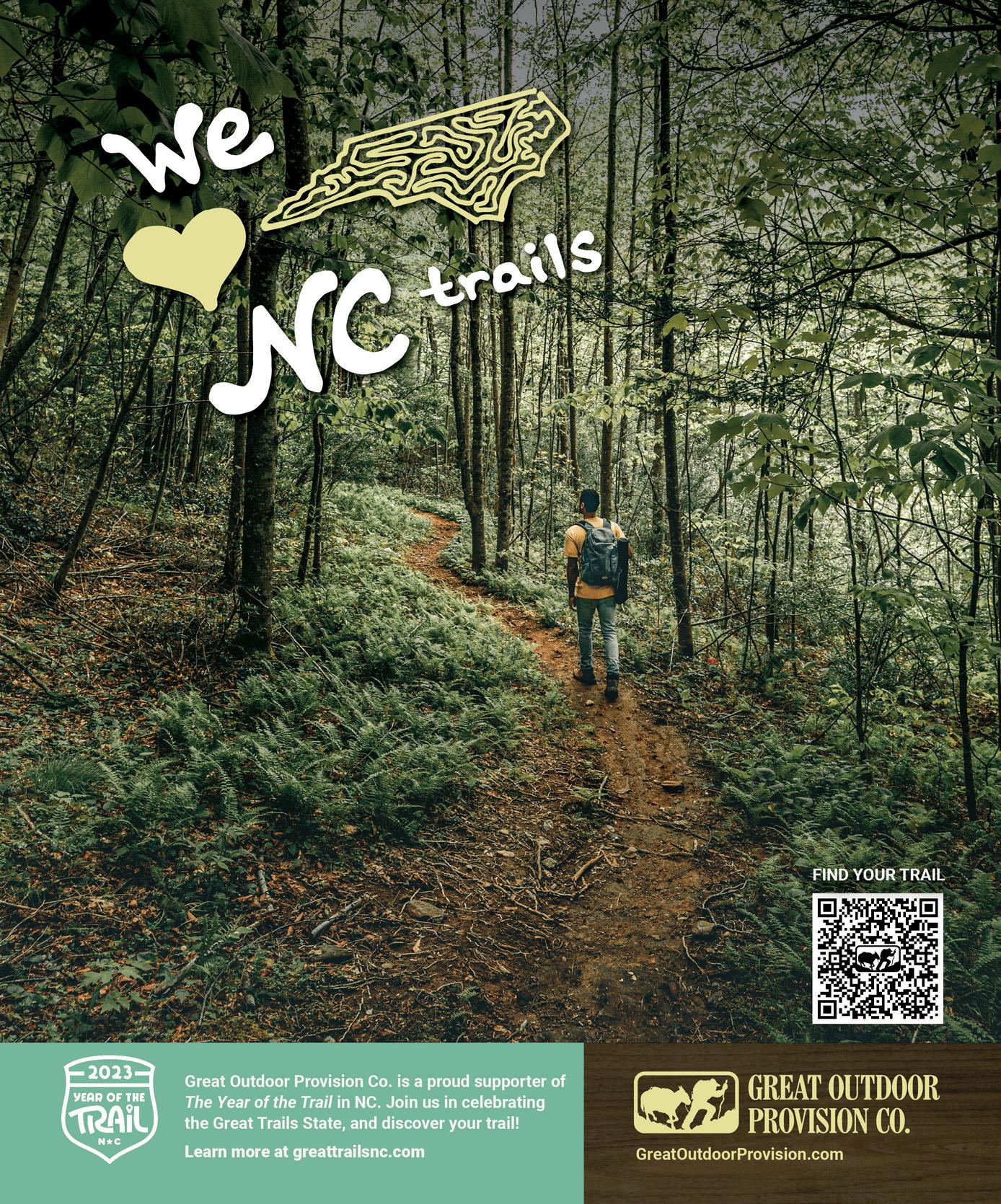
Since 1930. Trusted for Gener ations.







































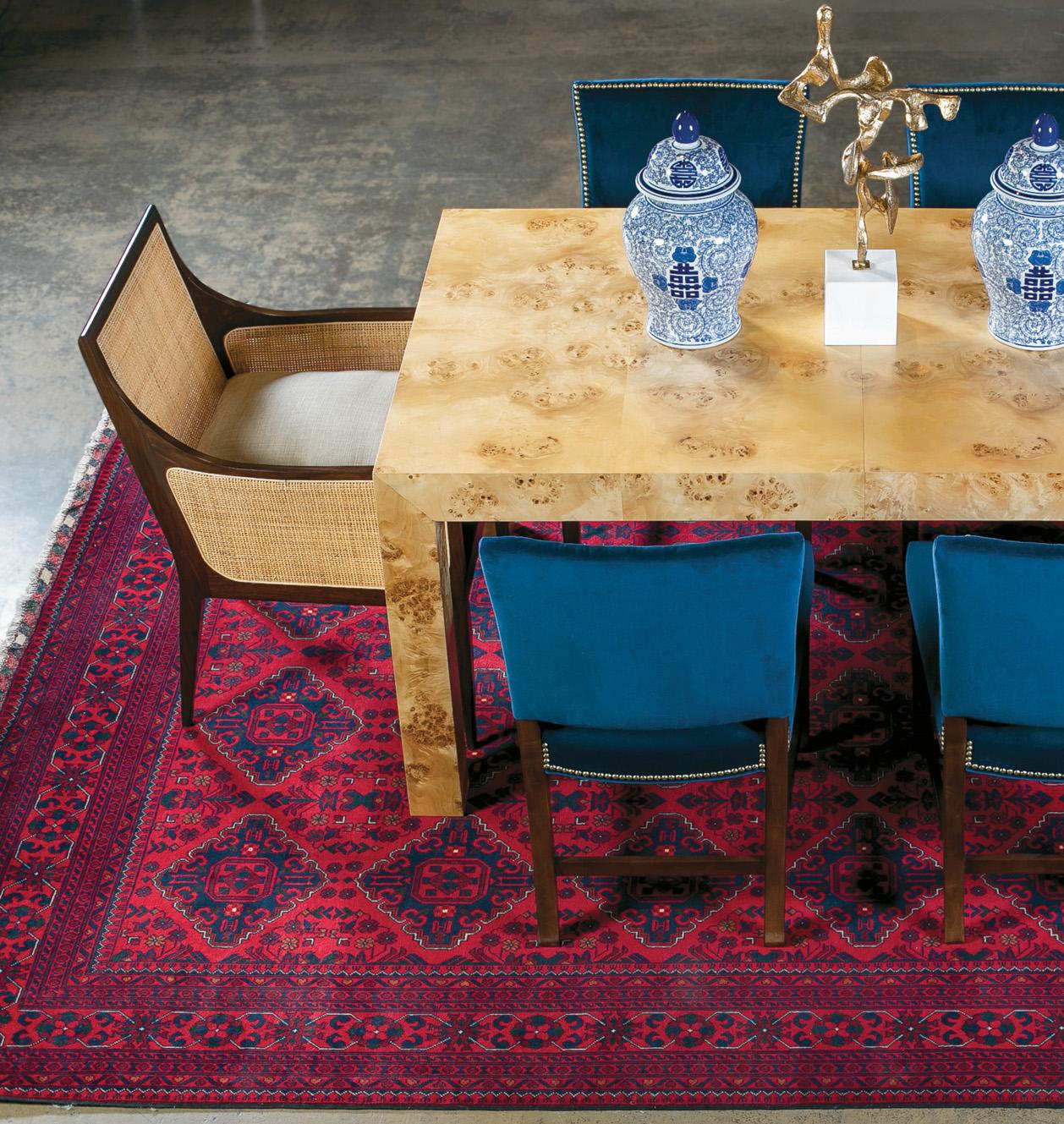
2004 YONKERS ROAD, RALEIGH, NC 27604 | 919-754-9754
MAKE NEW FRIENDS, BUT KEEP THE OLD
Just as in friendships, this classic adage is true in your home. A curated mix of long-loved pieces mixed in with new finds makes a home feel both intimate and up-to-date. It offers a window into your evolving interests, without forgetting your heritage.
With the new year comes an urge to refresh your space. Feel inspired to go bold with color and classic yet current groupings. Visit Green Front Furniture in Raleigh to find over 30,000 square feet of unique furniture, hand-knotted rugs, and luxurious upholstery.
 Table by Precedent, Chairs by Hickory Chair, Sculpture by Utterrmost, 8’ x 11’ Hand-knotted Wool Rug from Pakistan
Table by Precedent, Chairs by Hickory Chair, Sculpture by Utterrmost, 8’ x 11’ Hand-knotted Wool Rug from Pakistan
GREENFRONT.COM
CHAPTER 15

Wake-Up Call

Sheshould have known better. Peace and quiet were nearly impossible to come by with this bunch. They knew that after a long walk and an exhausting kiteboarding lesson, she’d be down for the count. But it’s OK. Dad will help her get back at them. Unless, of course, it was his idea all along.

Discover seasonal offers on vacation rentals & more at CrystalCoastNC.org

North Carolina’s largest, locally owned fine jewelry showroom. Specializing in engagement rings, loose diamonds, and custom jewelry design. Diamonds, Garnets & Amethysts Your ring, your colors, your symbol, www.RaleighDiamond.com | 919.725.3444 | 5925 Glenwood Avenue






JANUARY 2023 On the cover: Sir Walter Raleigh by Adam D. Cohen OUR TOWN 29VAULT: The New Guard Fresh talent in downtown arts 32 MUSIC: 2023 Playlist New work from area musicians 34NATURE: Swan Season Majestic birds on the coast 37LOCALS: A Franklin in Raleigh Another view of history 40CREATORS: The Buddy System The friends behind Haand IN EVERY ISSUE 14 Editor’s Letter 18 Contributors 19 Your Feedback 21 Datebook 85 The Whirl 95 Extras 96 End Note
10 | WALTER DEPARTMENTS 44SIMPLE LIFE: One Journey Ends, Another Begins Following the Great Wagon Road 34 40
Mike Dunn (SWANS); Mallory Cash (HAAND)
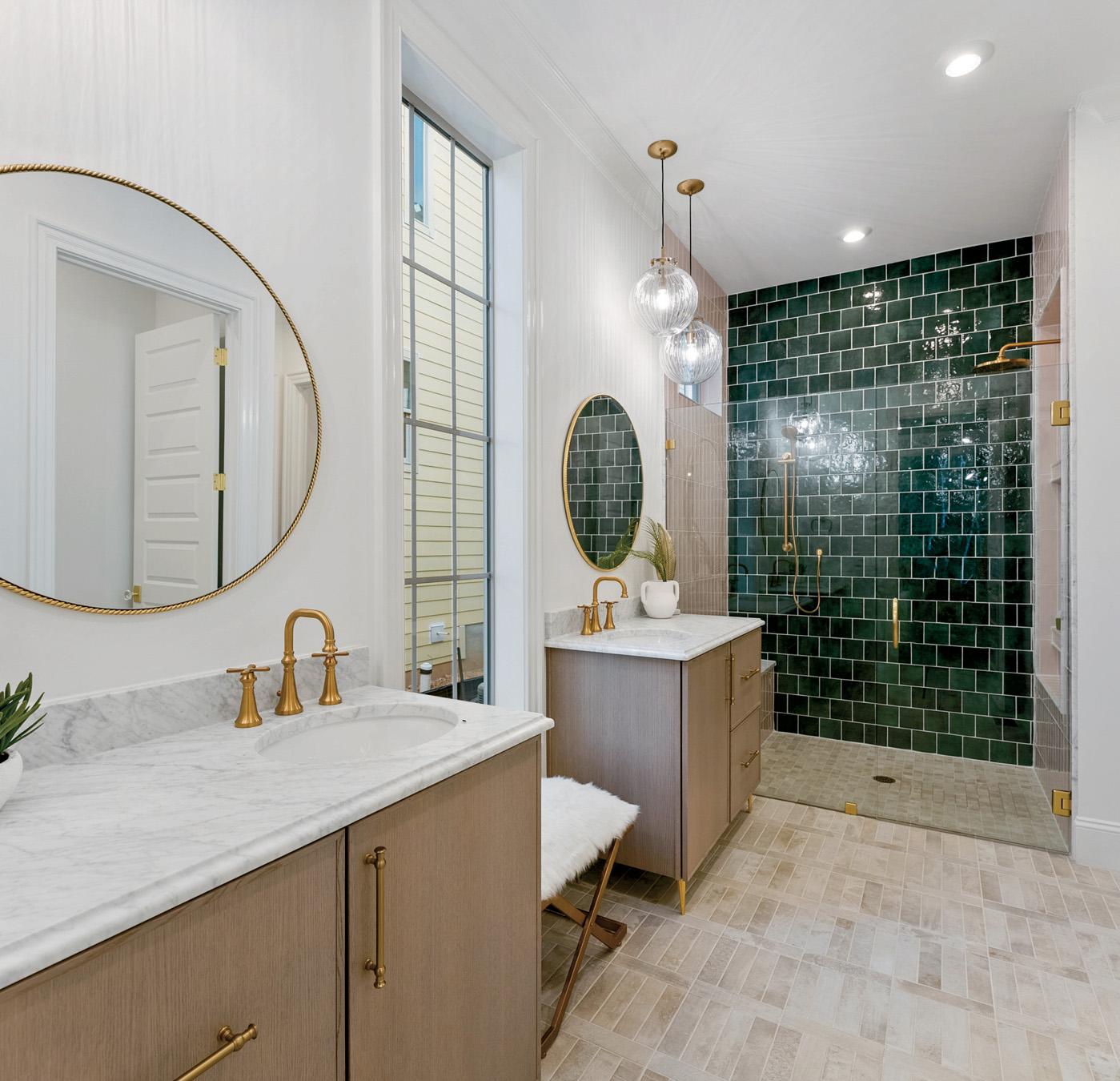
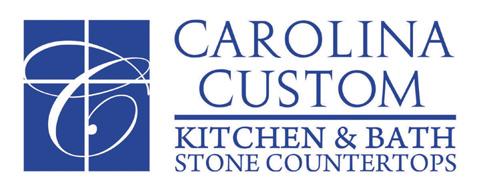
carolinacustomkitchen.com Apex Location 123 North Salem Street 919.363.6990 Raleigh Location 8828 Midway West Road Appointment Only
BY
HOMES
DICKERSON
FEATURES
49 Talking in the Dark by Paul Jones
illustration by Lyudmila Tomova
50 Where to Eat & Drink
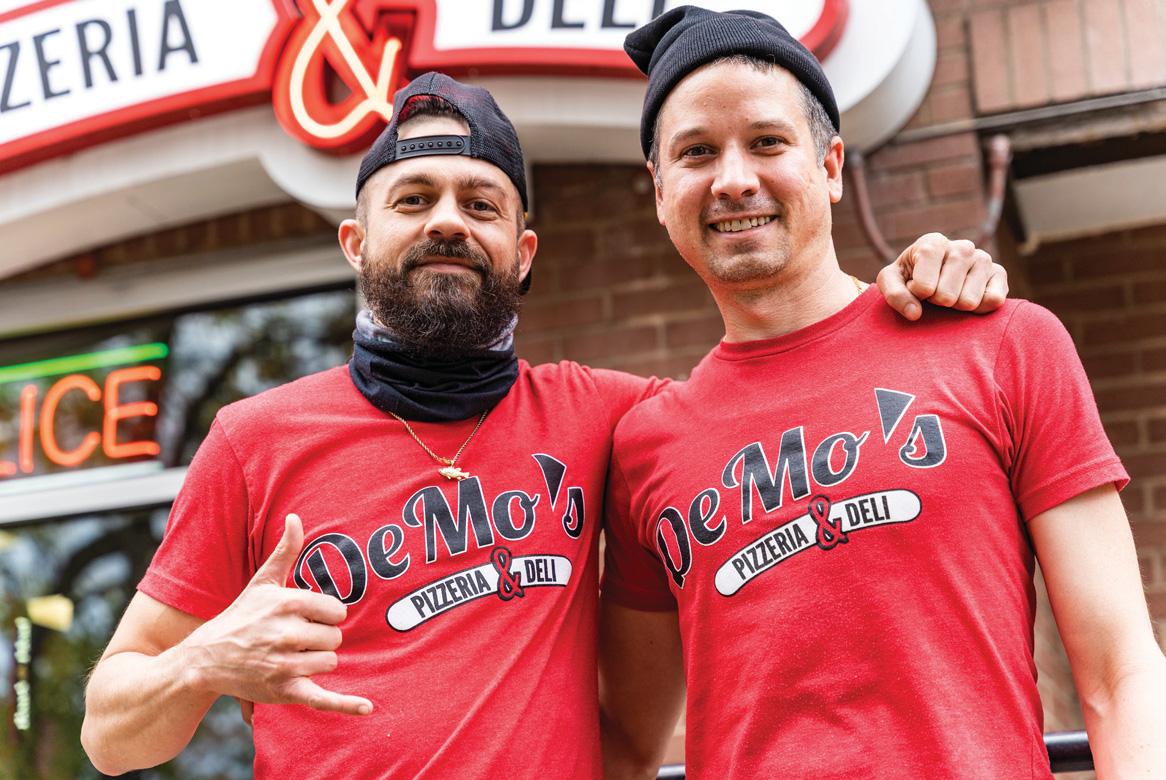
Chefs and bartenders share 100+ great spots for any occasion by Catherine Currin photography by Bryan Regan
58 Ebb & Flow
A photographer captures the Eno River with a vintage camera by John Gessner photography by Holden Richards

68 Cool Hues
A chic, family-friendly home in a modern palette by Ayn-Monique Klahre photography by Catherine Nguyen
78 Go Figure
Artist Adam D. Cohen on his creative life and vibrant portraits by Garrett Bethmann photography by Joshua Steadman
12 | WALTER
50
Bryan Regan (DEMO’s PIZZA); Holden Richars (ENO RIVER)
58

Love Your

















Our team has historically been pretty good about bringing in our lunches from home. But lately, this thrifty habit has gotten a little… out of control.

Pre-pandemic, leftovers were certainly in the rotation at lunchtime. But when we returned to the office after a year of working from home, there were far fewer options nearby for grabbing lunch. We also added a new staffer, Addie. She’s a real foodie, the sort who waxes poetic over recipe preparation and successfully grows veggies in her garden.
So we got better about bringing in our lunches, and then the lunches themselves got better. And at some point, we stopped preparing our lunches at home and just started bringing in the ingredients. These are usually assembled into salads, and they’re often a mix of greens, raw veggies and dinner leftovers.
These “salads” can mean vastly different things. I’ve been known to pack a head of almost-wilted romaine lettuce into a gallon ziplock bag, paired with extra taco filling from Friday night’s takeout. Cristina sometimes brings in a bagged salad from the grocery store. Addie brings in things like homemade salmon gravlax, blocks of romano cheese and pickled peppers to top her homegrown arugula. Her ingredients may sound a little “extra,”
but they come from a place of hating to waste food and knowing just the thing to turn sad leftovers into something delicious.
So now assembling salads is part of our lunch hour. We chat at the counter while we wash our veggies and chop them up. A few months ago, after lots of scouting, we invested in matching navy-blue bowls for our big salads.

Thanks to Addie’s influence, our salads may be topped with freshly grated lemon, a dollop of burrata or a drizzle of espresso-infused balsamic vinegar. Needless to say, she always has the best ingredients. And luckily for the rest of us, she always seems to bring a little extra to share.
We take up a lot of counter space and create a lot of dishes to wash. But it seems to me like we’re replacing the best part of going out for lunch with our cafeteria ritual. We’re taking the time to reconnect, and actually sitting down for a meal with real plates and silverware. All the benefits of the brown-bag lunch, but just a little more gourmet.
Ayn-Monique Klahre Editor

EDITOR’S LETTER 14 | WALTER
Left: Salad! Right: The WALTER team at a recent event: Addie Ladner, Kait Gorman, Cristina Hurley, Laura Wall, Julie Nickens and Ayn-Monique Klahre.
5634DurhamChapelHillBlvd., Durham,NC Beauty , Artistry&Tradition FOROVER45YEARS OpenMonday-Friday10amto6pm ClosedSaturdayandSunday www.persiancarpet.com







XPANDABLE™ Signet rings. A classic for any generation. At Haydon & Company… of course! Available in 18 karat yellow gold, 18 karat rose gold or platinum.
FRI, FEB 10, 2023 | 8PM
JANUARY 2023
EDITORIAL
Editor
AYN-MONIQUE KLAHRE ayn-monique@waltermagazine.com
Creative Director
LAURA PETRIDES WALL laura@waltermagazine.com
Associate Editor ADDIE LADNER addie@waltermagazine.com
Contributing Writers Garrett Bethmann, Wiley Cash, Catherine Currin, Jim Dodson, Mike Dunn, John Gessner, Hampton Williams Hofer, Jim Jenkins, Paul Jones, David Menconi
Contributing Copy Editor Finn Cohen
Contributing Photographers Mallory Cash, Bob Karp, Catherine Nguyen, Matt Ramey, Holden Richards, Bryan Regan, Joshua Steadman
Contributing Illustrators
Gerry O’Neill
Lyudmila Tomova
PUBLISHING
Publisher
DAVID WORONOFF
Advertising Sales Manager
JULIE NICKENS julie@waltermagazine.com
Senior Account Executive & Operations CRISTINA HURLEY cristina@waltermagazine.com
Events Manager
KAIT GORMAN kait@waltermagazine.com
Finance STEVE ANDERSON
910-693-2497
Distribution JACK BURTON
Inquiries? WALTER OFFICE
984-286-0928
Address all correspondence to: WALTER magazine, 421 Fayetteville Street, Suite 104 Raleigh, N.C. 27601
WALTER is available by paid subscriptions for $25 a year in the United States, as well as select rack and advertiser locations throughout the Triangle. Subscribe online at waltermagazine.com/subscribe
For customer service inquiries, please email us at customerservice@waltermagazine.com or call 818-286-3118.
WALTER does not accept unsolicited manuscripts.
Please contact Ayn-Monique Klahre at ayn-monique@waltermagazine.com for freelance guidelines.
Owners
JACK ANDREWS, FRANK DANIELS III, LEE DIRKS, DAVID WORONOFF In memoriam FRANK DANIELS JR.
© WALTER magazine. All rights reserved. No part of this publication may be reproduced in any form without the express written consent of the copyright owner. Published 12 times a year by The Pilot LLC.

16 | WALTER
Tchaikovsky Symphony No. 5
JAN
2023 | 8PM Lina González-Granados, conductor Revolution: The Music of the Beatles A Symphonic Experience
FRI/SAT,
27-28,
SAT,
Michelle Di Russo, conductor Weekend Sponsor: Celito.net Concert Sponsor: WakeMed
365 Primary & Urgent Care Dvořák Symphony No. 7 FRI/SAT, FEB 17-18, 2023 | 8PM Eduardo Strausser, conductor Samuel Almaguer, clarinet Aaron Apaza, bassoon Mozart Requiem FRI/SAT, FEB 24-25, 2023 | 8PM Carlos Miguel Prieto, conductor North Carolina Master Chorale MEYMANDI CONCERT HALL, RALEIGH ncsymphony.org 919.733.2750
FEB 11, 2023 | 3PM & 8PM
MyCare
Immerse Yourself in Live Music





Call for a free in-home design consultation and estimate 919-850-9030 closetsbydesign.com Follow us Licensed and Insured • Locally Owned and Operated IMAGINE YOUR HOME TOTALLY ORGANIZED Terms and conditions: 40% off any order of $1200, 30% off any order $700 or more on any complete custom closet, garage, or home office unit. Not valid with any other offer. Free installation with any complete unit order of $500 or more. With incoming order, at time of purchase only. 18 month financing (with approved credit) Available for a limited time. Expires in 90 days. Offer not valid in all regions. CUSTOM CLOSETS I GARAGE CABINETS I HOME OFFICES I PANTRIES I LAUNDRIES I HOBBY ROOMS 40% OFF + Free Installation
CONTRIBUTORS




BRYAN REGAN / PHOTOGRAPHER

Bryan Regan is a Raleigh-based photographer specializing in environmental, lifestyle, studio portraits and product photography. Dropping out of design and photography school, back when people still shot film, Regan learned his craft crisscrossing the country assisting other photographers. He’s had a studio downtown for 17 years. On shooting Where to Eat & Drink: “It’s always interesting to see the behind-the-scenes that make a restaurant run. You can never go wrong with a Benchwarmers bagel and a cold PBR from Slims.”
CATHERINE CURRIN / WRITER

Catherine Currin is a Raleigh native and former associate editor at WALTER. When she’s not working on her next story, Currin works on the brand marketing team at CAPTRUST. She is a graduate of Wake Forest University and enjoys giving back to her community through nonprofits like CASA and the YMCA of the Triangle. Currin wrote the Where to Eat & Drink guide. “This is one of my favorite WALTER stories —I love getting to know more folks in our culinary scene, plus adding a few new spots to my own list of go-tos.”
GARRETT BETHMANN / WRITER



Garrett Bethmann sees writing as a way to experience the best music and arts has to offer. Over the past decade, he’s covered the music and ski scenes in Lake Tahoe, written for record labels in Denver and worked at music festivals across the coast. He recently put roots down in the Piedmont, where he continues writing about music, outdoor recreation and environmental resilience on his blog, boogixote.com. “I loved being in the same room with Adam D. Cohen’s work. Meeting him is exactly why I like to do profiles. Talking with interesting people about the things they are passionate about is always exhilarating and inspiring.”
JOSHUA STEADMAN / PHOTOGRAPHER
Joshua Steadman is an editorial and commercial director and photographer based in Raleigh. He comes from a long line of storytellers. “I grew up listening to them all: tales told by my aunts, uncles, grandparents, cousins and my own parents. My father’s Nikkormat and a 28mm lens captured my childhood with love and attention. I think listening and being a photographer go hand in hand, and that’s what I try to do.” This month he photographed Adam D. Cohen. “I brought my son Vaughn along to help me set up the lighting, and we both enjoyed watching Adam work. He was incredibly focused.”
 courtesy contributors
courtesy contributors
18 | WALTER
Many people wrote in about “Home & Heritage,” about the Historic Turner Home.

“Wonderful article. As a Raleigh native, I am very interested in history like this.”




 — Kathryn Swearingen
— Kathryn Swearingen
“I’ve always wondered about that house!”
— Mary Pelosi
“Wonderful story! My parents were friends of the Crooms. Our dads were USAF dentists and served in England at the same time, and our moms were friends prior to. I have had the fortune to visit this beautiful house several times. I wish all the best for Cheryl and admire her perseverance.”
— Rosalyn Ollison
“Your post inspired us. We took our dancers to visit Clyde Jones’s home. ”

 — Violet Rhinehart
— Violet Rhinehart
@waltermagazine www.waltermagazine.com WALTER 421 Fayetteville Street, Suite 104 Raleigh, N.C. 27601 We love to hear from you! A few recent notes... Holly Springs Dance participants at a WALTER-inspired photo shoot in Bynum. The Art & Soul of Raleigh | 19 FEEDBACK 2023 Resolution #1: having a plan Cheers to a New Year and New Resolutions! One of the most impactful gifts to your children and yourself may be a move to a Continuing Care Retirement Community (CCRC). We are happy to host you for a tour, address questions and help you develop a plan for your future. Are you ready to give the BEST GIFT EVER? (No wrapping required) To schedule an appointment, call 919.518.8907 or visit TheCypressofRaleigh.com.
Chris Nieto



Enterprise Street LLC PRICED FROM THE HIGH $500S TO $1M+ Introducing THE LANSING, exceptional condominiums nestled in a tranquil setting only a short stroll from restaurants, shopping, and NC State University. THELANSINGRALEIGH.COM 919.410.7210 COMING SOON TO 101 ENTERPRISE STREET, RALEIGH NC The premier address for condo living in Raleigh’s Village District
OUR TOWN
Start the new year with evening walks, live music, comedy and charitable meals.
by ADDIE LADNER
THE GREAT COVER UP

Jan. 27 & 28 | See website
Kings is bringing back its popular revue, The Great Cover Up. The tradition started in 1999, with various local musicians performing as such legends as Patsy Cline, David Bowie and Lynyrd Skynyrd. The fun part: No one knows who will appear onstage — or as which famous musicians — until the curtains part.


“What started as a two-night event 20-plus years ago has grown to six nights. The last one had 54 acts,” says Kings co-owner Paul Siler, who runs the event.

“Everyone takes it so seriously. The talent level and positive energy always amazes me.” $10 suggested donation. 114 W. Martin Street; kingsraleigh.com
WE BUILT THIS
All month | See website
Historic Oak View County Park will host We Built This, a traveling exhibit by Preservation North Carolina that sheds light on skilled Black builders and architects who have long deserved recognition. Stewart Ellison, for example, was a carpenter and enslaved worker who helped construct what became Dorothea Dix Hospital. He went on to be one of the state’s longest-serving Black lawmakers in the late 1800s and was the first Black Raleigh City Council member. “There are so many amazing historic buildings in Wake County, but most of us walk into them and never think about who built them and what they went through,” says Shinica Thomas, vice-chair of the Wake County Board of Commissioners. “This exhibit features people who faced systemic racism and constant adversity. We preserve the legacy of that resilience in some of our most beautiful landmark buildings.” Free; 4028 Carya Drive; wakegov.com
ARTIST RECEPTION AT PULLEN ARTS CENTER


All month | See website
See the works of five female landscape artists at Pullen Arts Center for a group exhibition curated by former director Eliza Kiser, in which each offers her own point of view on landscapes. Tammy Kaufman’s fields of flower and creek beds, for example, are done in soft oil pastels, while Karen Rose’s dramatic views from
All information is accurate as of press time, but please check waltermagazine.com and the event websites for the latest updates
Gus Samarco (THE GREAT COVER UP); courtesy Pullen Arts Center (ART) The Art & Soul of Raleigh | 21
NOTED
DATEBOOK


global destinations are bold and bright, done with oil and acrylic paints. Other artists on exhibition are Patterson Canon, Ruth Little and Galina Stockstill. A closing reception for the artists will take place on Jan. 21 from 2:30 to 4:30 p.m. Free; 105 Pullen Road; raleighnc.gov
DREAMFEST
Jan. 13 - 16 | See website NOTED
TINA, THE TINA TURNER MUSICAL

Jan. 3 - 8 | See website
Grammy-winning Tina Turner may be a celebrated star today, but it was not easy to get there. Pulitzer Prize-winning playwright Katori Hall and acclaimed director Phyllida Lloyd have brought her story to Broadway and now to DPAC for TINA, The Tina Turner Musical. The production takes a beautiful dive into the strength, perseverance and raw talent Turner wielded to push through racism, the challenges women face in show business and what it means to age as an artist. From $35; 123 Vivian Street, Durham; dpacnc.com
JOHN PRINE TRIBUTE TOUR
Jan. 6 | 8 p.m.
It’s not often that a legendary musician’s relatives go on to replicate their music. While no one will ever be able to replace the late great John Prine’s soft country voice, dry humor or mellow disposition, his brother Billy Prine is on tour sharing his stories and playing his version of Prine’s iconic tracks. This month the John Prine Tribute Tour will make a stop at Cat’s Cradle. From $30; 300 E. Main Street, Carrboro; catscradle.com
Dreamfest is a 20-year tradition for the town of Cary that celebrates the life and long-lasting lessons of Dr. Martin Luther King Jr. with an informative, fun and reflective weekend. It kicks off on Friday night with comedian Azeem, who has performed on BET and Comedy Central, at Cary Theatre (122 E. Chatham Street). On Saturday, head to the Page Walker Arts & History Center for Tellebration, a day filled with tales, crafts and hands-on activities with award-winning storyteller Willa Brigham (119 Ambassador Loop, Cary). Then in the evening, head to the featured event: Reimagining The Dream For Today’s Generation will include keynote speaker Dr. Harry L. White Jr., a local Christian minister, at The Cary Arts Center (101 Dry Avenue). White will talk about King’s legacy and how we can honor that today. Also included in this portion of the event are talented local performers and artists and bites from food trucks. Sunday afternoon there will be a screening of the documentary Alice Street, about a community of diverse artists that band together to save a symbol of cultural representation, at the Cary Theatre (122 E. Chatham Street). The three-day celebration culminates with Walk For Hope on Monday, starting at Mt. Zion Church, to benefit survivors of abuse and addiction (316 Allen Lewis Drive, Cary). Most events free but tickets required; townofcary.org
FULL MOON WALK
Jan. 6 | 6 - 7:30 p.m.
Most days, the sprawling grounds of the North Carolina Museum of Art’s Museum Park shut down at sunset. But once a year, the museum hosts a guided evening walk under the moon, passing its larger-than-life works of art like Mike Cindric and Vincent Petrarca
Lowe’s Pavilion steel structure or Yinka Shonibare’s giant colorful kite-like Wind Sculpture II. The Full Moon Walk is a fun way to reflect on the art on the museum grounds, enjoy the starry night sky and get in some physical activity. Free; 2110 Blue Ridge Road; ncartmuseum.org
ILLUMINATE ART WALK

Jan. 6 & 13 | See website
For the third year in a row, downtown streets, plazas and storefronts will
be adorned with glowing works of art for Downtown Raleigh Alliance’s Illuminate Art Walk presented by Wake Tech. Stroll by Nate Schaffer’s Disco Alley on Glenwood Avenue, Brite Creations’ Glow Zone on Fayetteville Street and The Sonic Runway on S. Salisbury Street, an interactive light-art installation that converts audio signals into patterns of light that shoot down a 400-foot-long tunnel. Free; downtown Raleigh; downtownraleigh.org/illuminate
 courtesy DPAC (TINA TURNER); courtesy Downtown Raleigh Alliance (ILLUMINATE ART WALK)
courtesy DPAC (TINA TURNER); courtesy Downtown Raleigh Alliance (ILLUMINATE ART WALK)
22 | WALTER
Dr. Harry L. White Jr.
WINTER YOGA
Saturdays | 10 - 11: 30 a.m.



Start the year on a zen foot at City of Raleigh Museum’s Winter Yoga series. Each Saturday, enjoy a free session inside the museum led by various teachers in the Triangle. On Jan. 14, Priya Amaresh will do a Hatha session for adults, a type of yoga that uses physical moves and breathing strategies to channel one’s inner energetic force. On Jan. 28, Karen Burkes will do a Slow Flow session for all skill levels. Don’t forget a mat and water bottle! Free but registration encouraged; 220 Fayetteville Street; raleighnc.gov
Pigfish Lane Antiques & Interiors




GEORGE LOPEZ




Jan. 15 | 8 p.m.
You might have seen him on HBO, ABC or Netflix, but now you can see him on stage at the Duke Performing Arts Center. Grammy-nominated comedian, actor, host and best-selling author George Lopez is coming to Raleigh’s Memorial Auditorium this month for his OMG Hi Comedy Tour. Lopez is known for his honesty, humor and ability to raise awareness on issues around Latin American culture and politics. From $47; 2 E. South Street; dukeenergycenterraleigh.com

SOUTHERN SONGBIRDS: RISSI PALMER
Jan. 21 | 7 p.m.
This month the North Carolina Museum of History will host Durhambased country music artist and Color
The Art & Soul of Raleigh | 23 EVERYONE LOVES SHOES FROM MAIN & TAYLOR North Hills 919.821.1556 shop online: mainandtaylorshoes.com hll main RY O M EVE R E V E F R i
antiques • porcelain • art old & new • custom framing • carpets lamp shades & repair • custom-built furniture • (919) 436-4006 • • 5425 Hillsborough Street, Raleigh “INTERESTING STUFF” FOR YOUR HOME & COLLECTIONS
courtesy Duke Energy Center (LOPEZ)
Me Country radio show host Rissi Palmer as part of its Southern Songbirds music series. The performance, emceed by the famous Jim Lauderdale, is the finale of the series hosted in conjunction with the museum’s exhibition The Power of Women in Country Music, a traveling exhibit from the GRAMMY Museum. The exhibit is a collection of outfits, instruments, song lyrics and more artifacts that belong or belonged to legendary females in the county music industry. From $20; 5 E. Edenton Street; ncmuseumofhistory.org
WINTER SHOWCASE SOIRÉE


Jan. 22 | 1 - 4 p.m.

Heading down the aisle soon, or know someone that is? Bring them to Boylan Avenue’s historic Heights House Hotel for a chic wedding expo with local wedding planner The Gathering Co. Tour the inn’s interior and grounds while learning about local wedding vendors like floral design studio Once Gathered, event





NOW SERVING

Jan. 22 |

5:30 - 9: 30 p.m.


NOTED


Hummingbird’s Coleen Speaks, Preeti Waas from Cheeni and sommelier Paula de Pano from Chapel Hill’s Rocks + Acid are coming together for the first of the Sunday Supper series for 2023. Proceeds benefit NowServing, a nonprofit that matches communitybased organizations with restaurants to help neighbors in need. This dinner benefits Meals on Wheels of Wake County, which provides homebound seniors with hot meals. The menu includes fried oysters pakora, duck wellington and an orange-fennel bread pudding. From $135 per seat; 1053 E. Whitaker Mill Road, Suite 111, resy.com
Make a Statement







courtesy Hummingbird (COLEEN SPEAKS) 24 | WALTER
DATEBOOK
Diamonds, Estate and Antique Jewelry • Loose Diamonds of all Shapes and Sizes • Certified Appraisals • Expert Jewelry Repairs WE BUY DIAMONDS, GOLD AND PLATINUM 345 S. WILMINGTON STREET • 919.832.3461 • RELIABLE JEWELRY.COM
production company Folie a Deux and wedding dress boutique a&bé Bridal. While there, enjoy specialty cocktails, appetizers and desserts while listening to the sounds of the violin and viola from musical pair Duo Licht from Winston-Salem. Free to attend; 308 South Boylan; heightshousenc.com
ON THE MENU
Jan. 25 | 12 - 1:30 p.m.

Get to know the Inter-Faith Food Shuttle, an organization that’s on a mission to eradicate hunger in North Carolina, through a new lunch series, On the Menu. It’s a way to see behind the scenes and learn about the depth of their work, including programs like Cooking Matters and Grocery Bags for Seniors. This month, participants tour the food distribution warehouse at the Vernon Malone Center and enjoy a boxed lunch made from food that would have otherwise gone to waste, provided by the Food Shuttle’s food truck, the Spinning Plate. Free; 1001 Blair Drive, foodshuttle.org
DON GIOVANNI
Jan. 27 & 29 | See website




Experience Wolfgang Amadeus Mozart’s operatic story of Don Juan, the fictional character that’s become a household name. “Italian for Don Juan, Don Giovanni is the famous philanderer with a perpetual craving for women,” says North Carolina Opera director Eric Mitchko. “He is rich and powerful, handsome and charming, and he refuses to be bound

The Art & Soul of Raleigh | 25
House (HEIGHTS HOUSE) Free Admission for Museum Members | Tickets: naturalsciences.org/thedeep Now open thru May 7, 2023 Developed ByIn collaboration with Touring partner Sponsored by Sponsored by SECU and WRAL/FOX 50 with additional media support from INDY Week, PBS North Carolina and WUNC, North Carolina Public Radio. James Cameron – CHALLENGING THE DEEP is a traveling exhibition produced by the Australian National Maritime Museum, in association with the Avatar Alliance Foundation, and is toured internationally by Flying Fish. A USA Programs exhibition supported by the USA Bicentennial Gift Fund. SPECIAL EXHIBITION SPECIALIZING IN THE ART OF HOSPITALITY Fine Porcelains, Fun Furnishings, Vintage Barware, Unique Gifts 1846 Wake Forest Road, Raleigh NC 27608 919-621-1771 shop our new website at thefabfoo.com Follow us on Instagram and Facebook @thefabfoo
courtesy Heights
by any of society’s laws or expectations. His motto is long live freedom — but can he ever truly be free if he has no control over his own desires?” Find out in this provocative, emotional threehour production performed in two acts (with an intermission) in lyrical Italian with English supertitles. From $24; 2 E. South Street; ncopera.org

BLOOD WEDDING
Jan. 27 - 29 | See website



When an ex-lover steals the bride from her impending nuptials, the town of Andalucía goes after them in the middle of the night — and the evening takes a dark, psychedelic turn. Originally written in 1932 by poet and playwright Federico García Lorca, Blood Wedding is based on a true story about a deathly feud between two passionate Spanish families. “It features incredible language, characters and theatricality, and we are excited to share this gripping and magical Spanish tragedy with the community,” says Raleigh Little Theatre director Patrick Torres. From $27; 301 Pogue Street; raleighlittletheatre.org
ASTRONOMY DAYS

Jan. 28 & 29 | 10 a.m. - 5 p.m. Head to outer space with the North
Carolina Museum of Natural Sciences and the Raleigh Astronomy Club. Explore the universe with hands-on crafts, engaging presentations, rockets, telescopes and a real-life astronaut. Themed Humans in Space: Past, Present, and Future!, this event series will appeal to even the youngest aspiring astronauts. Free; 11 W. Jones Street; naturalsciences.org
DATEBOOK courtesy NC Opera (DON GIOVANNI); courtesy Museum of Natural Sciences (ASTRONOMY) 26 | WALTER
BRING YOUR VISION TO US
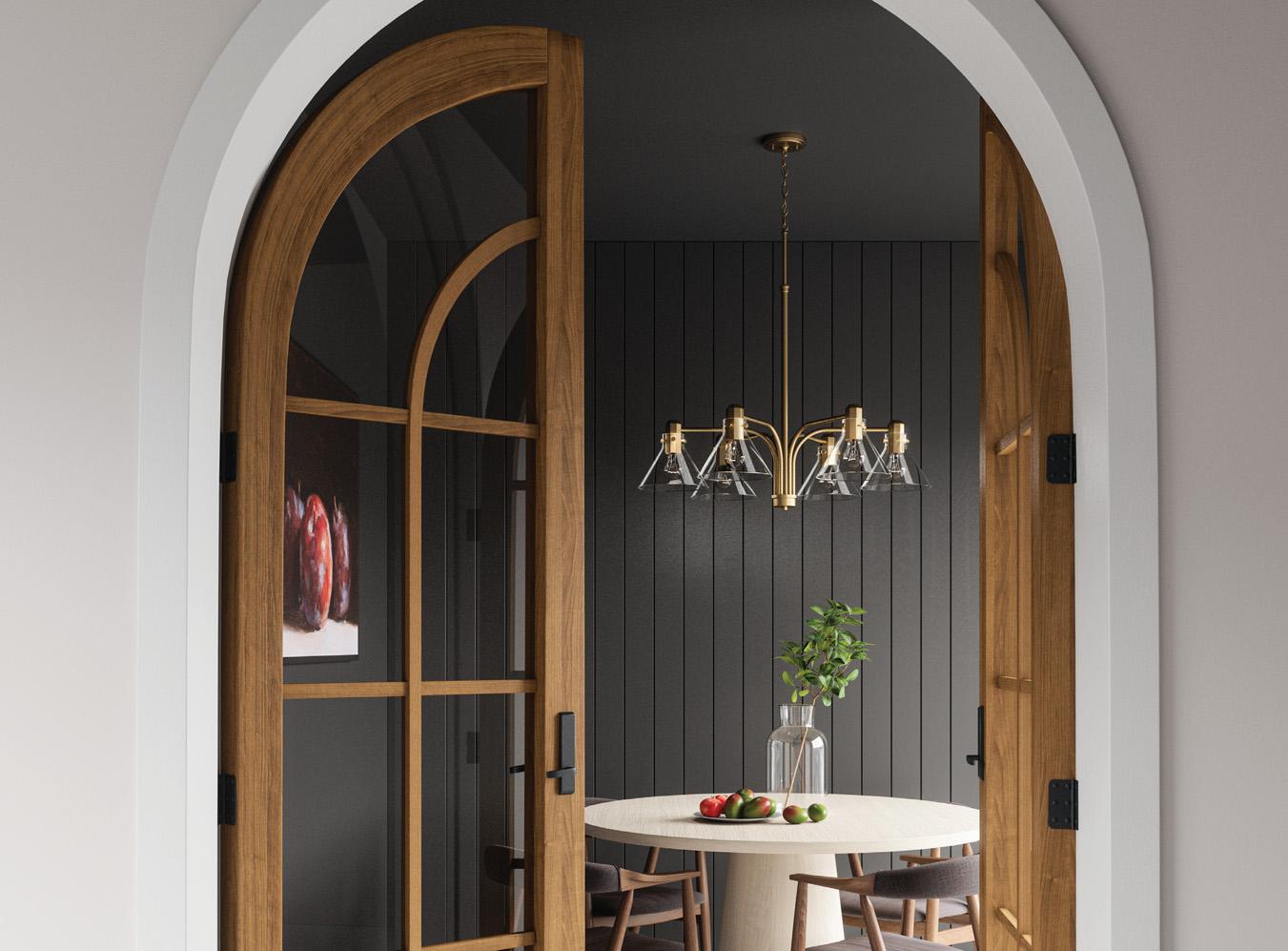
©2022 Ferguson Enterprises LLC 1122 4440211
YOUR LOCAL SHOWROOM: RALEIGH
The experts at Ferguson Bath, Kitchen & Lighting Gallery are here to help create a home that’s as extraordinary as you are. Any project, any style, any dream—bring your inspiration to fruition at Ferguson Bath, Kitchen & Lighting Gallery. Visit fergusonshowrooms.com to discover more and find your nearest showroom.
Greer Chandelier

the NEW GUARD
Four downtown arts organizations have new directors
 by HAMPTON WILLIAMS HOFER photography by BRYAN REGAN
by HAMPTON WILLIAMS HOFER photography by BRYAN REGAN
As of the past year and a half, four major downtown arts organizations have new faces at their helms, eager leaders who are breathing new life into the city’s dynamic art community. Each has inherited a storied art institution with long traditions in Raleigh, and each joins at a time of rebuilding. Recent years have brought upheaval and reckoning, particularly downtown, so the new directors — who bring fresh talent to the city’s art stage — aim not only for growth but inclusion.
Artspace CEO Carly Jones is one of
these new leaders. The Raleigh native joined the nonprofit visual arts center on E. Davie Street in 2021 after a nationwide, paid search for the position. For this longtime community advocate and arts enthusiast, Artspace was in her bones: She had been a kid at its art camp and a young adult at its First Fridays. Now she is in charge. “I consider nonprofit leadership to be a public service,” says Jones, “and I am honored to give back to the city that raised me in this creative and special way.”

Artspace is all about removing barriers to make art, including the creative
process, accessible to all. Since its inception in 1986, Artspace has engaged with over 2 million visitors. A creative space for arts education and social practice, Artspace hosts artist exhibitions in three galleries and has over 25 studios where artists work with various materials and techniques, from painting to printmaking. Jones joined as the post-pandemic world slowly returned to life, and from the beginning, she was opening doors and making sure new people found their way to Artspace. During the recent FRESH exhibition, which included more than 250 North Carolina artists, many
The Art & Soul of Raleigh | 29 VAULT
Left: Carly Jones
Right: Paul Baker
participants celebrated having their first piece featured in a gallery show. “It has warmed my heart to experience exhibitions that are a celebration of our artists’ communities and their many cultures, integrating music, dance, poetry and food that complement the visual art,” says Jones.
The Summer Celebration exhibition of youth art gathered families across the Triangle to celebrate their children’s artwork: “It has been a thrill to see the pride of new artists and their families as they enter the doors of Artspace to a place that is fully welcoming,” says Jones. “Our amazing team works hard to make sure we have opportunities that are inclusive and celebratory of all people throughout the Triangle.”
Previously, Jones had worked with the North Carolina Arts Council to provide support for arts organizations across the state, so she already knew that Artspace was a hub for the largest public community of visual artists under one roof in


the state. Along with exhibition spaces and classes for any ability, Artspace provides subsidized studio space for all artists. “My hope for Artspace is to change and grow with our city, as more people from diverse backgrounds call Raleigh home,” says Jones.
Three blocks away, nonprofit gallery and creativity incubator VAE (Visual Arts Exchange) lured new director Kayla Coleman down from New York City to its new office on Fayetteville Street in January 2022. Former VAE Director Brandon Cordrey said it was clear from the committee’s very first conversation with Coleman that she was the leader for the job. “Kayla has the skills, knowledge and personality to build a coalition,” he says, “and to use VAE to meet the current cultural moment and shape our community’s artistic future.”
A lifelong New Yorker, Coleman had been the deputy director of the Percent for Art Program, which commissioned and curated public art for the NYC
school system, the largest in the country. Coleman saw the VAE job as the culmination of her passions for art and access, a chance to work with a vibrant community of artists in a way that she had not been able to before. “I can work closer with artists in Raleigh, because I am no longer an employee of a city,” she says. “I can work from passion to affect change without the pesky interference of government oversight, which allows me to give resources and opportunities directly to those who need them, without waiting on the slow wheels of policy to turn.”
Here, she says, she can learn artists’ needs and create opportunities with rather than for them. “Sometimes, it’s as formal as using a steering committee, and other times it is just having a conversation,” says Coleman. “When you work with artists and creatives, you tend to wear a lot of hats. There’s a vein of DIY in all of us, because we are able to do so much with limited resources.”
VAE organizes more than 80 exhibi-
VAULT 30 | WALTER
Left: Kayla Coleman
Right: Jaci Field
Jade Wilson (COLEMAN)
tions and community programs each year and provides some $200,000 in funding for artists. Coleman’s biggest goal is to expand the scope of their reach. “More than anything,” she says, “I want people to see VAE as a resource. I want the equitable opportunities to continue to flow — whether it is through innovative programming, fellowships, granting opportunities, internships or more, I want to be able to provide across the spectrum.” For one, she wants to further develop their Collaborative Curatorial Fellowship, which supports a fellow to research an idea and turn it into an exhibition. “I encourage people to tell me what they need. If I can figure out a way to make it happen,” she says, “I will.”
A few blocks further west, Dr. Paul Baker joined the Contemporary Art Museum of Raleigh (CAM) team as executive director in August. He got his start in museums giving gallery talks as an undergraduate art major at the University of North Carolina at Chapel Hill. With a masters in Public History, as well as a Ph.D. in Leadership Studies and Policy from North Carolina State University, Baker completed his certification in museum management at Harvard University. The research lover has also completed fellowships at Yale University, the University of Virginia and the University of Oxford. Having lived in Raleigh for more than 20 years, Baker came to CAM from North Carolina Agricultural and Technical State University, where he served as director of the university galleries and a tenured professor of history. At CAM, he aims to continue the museum’s upward trajectory as an approachable museum. “We want to continuously bring new people through the doors through engaging exhibitions and programs,” he says. “We want to launch emerging artists’ careers, give them the opportunity to shine and share their talents.”
One of Baker’s particular passions is fostering an affinity for visual arts in young people. A new project called Art in Educational Spaces places art from CAM’s collection in local libraries, middle schools and elementary schools. It’s all
about exposure, he says: “Who knows what future artists will be inspired from a project like this?”
The newest of the new faces of downtown art is Jaci Field, who started as executive director of Artsplosure, a nonprofit arts and cultural event production studio, in early October. The Cary native brings 29 years of event management experience to the job, having worked the Olympic Games in Atlanta, and, most recently, as the assistant athletic director of capital projects and facilities at UNC-Chapel Hill, her alma mater. “Raleigh won my heart when I moved here almost 19 years ago,” Field says. “I love the neighborhood feel with the big city offerings. I love how vibrant Raleigh is.”
Artsplosure enriches the community through experiencing art, and it’s best known for WRAL First Night Raleigh, the New Year’s celebration that’s become part of the fabric of the city, and for its annual art festival Artsplosure. For two days each May, the festival takes over downtown, lining Fayetteville Street with imaginative installations, a huge art market, interactive crafts and live music. “Artsplosure brings art to the community in a way that creates a feeling, a vibe and memories,” says Field. “Looking back at photos of the Paperhand Puppets, the gratitude art wall or the Bubbles installation in City Plaza, Artsplosure reflects the vibrancy of who we all are here in Raleigh.”
Artsplosure is funded in part by the City of Raleigh and the North Carolina Arts Council. “I appreciate that local government is managing the continual growth in thoughtful and relevant ways,” says Field. “Artsplosure’s events reflect that growth and change.” Like Baker, Field aims to ensure her organization is poised to grow along with Raleigh’s di-
verse community. Artsplosure is, she says, the perfect blend of production, tradition and growth. “One thing that differentiates Artsplosure is the high caliber of art without the barrier of entry,” says Field. “I want to utilize my event experience, love for the arts, passion for making art accessible and my joy for helping others to continue this great tradition.”
An exhibition coming in March to CAM is an example of the important work these organizations are doing to nurture local talent. Textile artist Aliyah Bonnette uses improvisational quilting to stitch together stories of Black women across time. Her work has been shown through VAE, she was also a former Artspace summer art camp intern, and she is this year’s regional emerging artist in residence at Artspace. “Bonnette is so interesting as an artist,” Baker says, “because her talent is inspired by generations of women in her family who sewed and quilted.” For Bonnette, these organizations have been welcoming and validating. “Being at Artspace helped me get comfortable with having a public studio space, and has been a great opportunity to meet people from all different walks of life and facilitate conversation centered around my work,” Bonnette says. “The Raleigh art community welcomed me and my work with open arms.” Baker sees the value in community-driven artists like Bonnette. “As Raleigh grows,” Baker says, “CAM will grow along.”
If a city’s art community is indicative of its vibrancy, of its connectedness, then Raleigh is flourishing. “I’m proud of my home, and I understand why folks want to plant roots here,” says Jones. “Our people, our food, our culture and our arts scene are all a part of the tapestry that makes Raleigh so special.”
The Art & Soul of Raleigh | 31
“When you work with artists and creatives, you tend to wear a lot of hats. There’s a vein of DIY in all of us, because we are able to do so much with limited resources.”
— Kayla Coleman
2023 PLAYLIST
New work from local musicians to put on your radar
by DAVID MENCONI
Last year was a fantastic one for local music, and the great thing is that plenty more is on the way for 2023. Here’s what some of North Carolina’s notable acts have been up to, upcoming performances to bookmark and the songs that signal what’s next.
“LITTLE THINGS” BY AMERICAN AQUARIUM
Raleigh’s American Aquarium has always been one of the hardest-working bands in all the land, so much so that it

took a pandemic to finally get them off the road. But more time at home agreed with lead singer BJ Barham, who relished the extra time with his young daughter. In this charming ode to family life from the band’s Chicamacomico album, Barham sings that he’s gone from rock star to being “just a father and a husband who knows his way around a microphone.” And yet the stage still beckons. American Aquarium’s eighth annual “Roadtrip to Raleigh” hometown performance is set for Feb. 2 through 4 at downtown Raleigh’s Lincoln Theatre.
“JULIE’S ARIA” BY RHIANNON GIDDENS
Greensboro native Rhiannon Giddens is running out of worlds to conquer, as North Carolina’s homegrown MacArthur “Genius Grant” winner had another power year on prestigious stages, pages and screens. In 2022, Giddens played New York City’s legendary Carnegie Hall, published her first children’s book, Build a House, and, in a nod to her early classical training, debuted her first opera, Omar, at the Spoleto Festival. One of that work’s compositions was “Julie’s Aria,” featuring the otherworldly tones

32 | WALTER MUSIC
Scott Sharpe
Left: Rhiannon Giddens
Right: American Aquarium
of guitarist Bill Frisell. Omar will play at University of North Carolina at Chapel Hill’s Memorial Hall on Feb. 25 and 26. Also in 2023, look for her new PBS series, My Music with Rhiannon Giddens.
“IT
DOESN’T CHANGE ANYTHING” BY SARAH SHOOK AND THE DISARMERS
Chapel Hill’s Sarah Shook stayed busy in 2022 with multiple releases, starting with album number three backed up by longtime honky-tonk band The Disarmers. “It Doesn’t Change Anything” is the title track, with typically doomy sentiments (“The devil on your shoulder is your only friend/There he sits just to remind you all good things come to an end”). But fall brought a left turn into new-wave pop as Shook’s side-project band Mightmare released the LP Cruel Liars. For 2023, Shook will get back to country with another Disarmers album.
“DIDN’T CARE” BY SYLVAN ESSO
This Grammy-nominated electronic duo from Durham has always had a folksy streak, so it made perfect sense for them to debut their new album No Rules Sandy and its percolating single “Didn’t Care” — released on Sylvan Esso’s own multimedia record label imprint Psychic Hotline Records — onstage at the legendary Newport Folk Festival last July.

Elsewhere, Sylvan Esso presided over a series of live local happenings highlighted by a sold-out three-night run at the old Durham Athletic Park, which felt like a lovely celebration of community. There will be more of the same in 2023, starting with a solo album by local fixture Joe Westerlund they’ll release on Psychic Hotline in February.
“IF YOU LOVE ME, DEAR, FOR GOODNESS SAKES, HUSH” BY C. ALBERT BLOMQUIST
Carrboro resident Clark Blomquist is a chameleon-like presence on the local music scene, playing a dizzying array of far-ranging styles — psychedelic pop, one-man-band electronic dance music, hardcore punk — under different names. As C. Albert Blomquist, he’s an amiable honky-tonk ghost singing barroom country songs, like this sly number from his 2022 self-titled album. Blomquist has another country album coming out in 2023, and he’s also back playing again with the great Chapel Hill retro-pop band Kingsbury Manx.
“ENDLESS SUMMER” BY SUPERCHUNK
What always set Superchunk apart from its Chapel Hill indie-rock peers was catchiness, and that also goes for the group’s 2022 LP Wild Loneliness,
the 18th Superchunk album in a career going back three decades. The high point is “Endless Summer,” a perfect summertime song that shimmers with the kind of pop hook lesser bands seek but never find. The first quarter of 2023 will find Superchunk drummer Jon Wurster on the road with one of the other bands he plays in, John Darnielle’s Mountain Goats.
“DOVETAIL” BY H.C. MCENTIRE
No performer better evokes a North Carolina sense of place better than H.C. McEntire, whose records feel like travelogue dispatches from our state’s rural environs. Her deep voice is in fine form on “Dovetail,” a stunningly emotional ballad released to preview McEntire’s 2023 album Every Acre, coming out later this month.
“IT’S
THE SMALL THINGS, CHARLIE BROWN” BY BEN FOLDS
In recent years, Chapel Hill expatriate Ben Folds has spent more time on cool extracurricular projects than making records of his own, including the “Keys for Kids” initiative, in which he raises money for music education across North Carolina. Still, he’s been working on what will be his first full-length album since 2015, which should see the light of day in 2023. In the meantime, he also dropped the theme song to a TV special, “It’s the Small Things, Charlie Brown.”
“90 PROOF” BY SMINO FEATURING J. COLE
Rapper J. Cole’s last full-length album came out in 2021, but he hasn’t been idle. He’s kept busy with cameos on other artists’ records, including those of Compton rapper YG, Bia (who rose to prominence on the television show Sisterhood of Hip Hop) and St. Louis rapper Christopher Bjorn “Smino”
Smith’s 90 Proof. He’s also got another Dreamville Festival on the way — and there’s an excellent chance at least one of those acts will be on the bill. Last year’s festival drew 80,000 people to Dorothea Dix Park; expect the same this April.
The Art & Soul of Raleigh | 33
New Hope Creek in Duke Forest
Bailey Atwater
Sylvan Esso
SWAN SEASON
Along the coast, thousands of majestic birds gather in winter
words and photography by MIKE DUNN
The season of the swans is a magical time. In November, thousands of Tundra Swans arrive in northeastern North Carolina, where they’ll stay through February. Year after year, I find myself drawn to spend time in their elegant presence.

Tundra Swans occur in two population groups according to their migratory flyways: a large eastern one that the United States Fish and Wildlife Service estimates at around 117,000 and a smaller
western one of about 56,000. Most of the eastern flyway swans breed in arctic wetlands, then migrate more than 3,000 miles to spend the winter along the East Coast. An estimated 70% to 80% of those overwinter in North Carolina, making the refuges, lakes, sounds and fields of the eastern part of our state a critical habitat for Tundra Swans. Some of the best places to observe our wintering swans are Pea Island, Lake Mattamuskeet and Pocosin Lakes National Wildlife Refuges, and on Lake Phelps at Pettigrew State Park.
Over my decades of observing Tundra Swans, I have enjoyed many special moments. Most of them start at dawn, when the birds are still in their overnight roosting spots in open water safe from most predators. After daybreak they will fly out periodically to feed. The swans’ diet has primarily been aquatic vegetation in our sounds and large coastal lakes, but they now feed extensively on waste grain and winter wheat in agricultural fields due to declines in natural vegetation. When not feeding, swans spend a lot
34 | WALTER NATURE
of time napping. They also spend a lot of time preening: Each Tundra Swan has about 25,000 feathers, compared to 14,000 for a Northern Pintail duck or 7,000 for a Bald Eagle (and the American Robin has only around 3,000 feathers!). This self-care and relaxation are occasionally interrupted by squabbles between adjacent groups of swans over things that only they understand. These aggressive bouts usually involve outstretched necks with trumpeting calls, wing quivers and, if all that bluster fails, actual physical contact like aggressive biting and flailing of their impressive wings.

Following an encounter, group members often engage in more wingquivering and calling, the so-called “triumph ceremony.” (This is oddly similar to human behavior when family members reunite — we all know those gatherings can sometimes have their moments.) Afterward, there is often a “wing flap” by one or more of the group members. It’s a striking behavior: The bird rises up and flaps three or four times, exposing amazing sculptural details in its huge wings. Every winter,
I spend way too much time trying to photograph the perfect wing flap.
For several winters, my museum educator workshops assisted biologists with swan capture and banding on the Pungo Unit of Pocosin Lakes National Wildlife Refuge as part of a study on migratory movements. We’d use corn to draw the birds to bait stations at the edge of the water, then capture them by firing a net. Staff would rush in and hand birds out from under the net to volunteers, who each then took their bird to a processing station to weigh it, determine its sex and put a leg band put on. Then the volunteer would walk their swan to the lake edge and release it.
These birds are hard to handle: Each weighs 15 to 20 pounds, with a wing span of up to 6 feet and a powerful kick. The trick was to get control of its wings and hold them with their feet pointing away from you. Once that was done, the birds
would calm down, and sometimes they would lay their heads on the volunteer’s shoulder while waiting to be processed. (I joked that if just one swan were to tell the others to “go for their eyes,” the whole study would have been hopeless.) But holding and releasing one of these majestic birds, knowing I was helping learn more about its critical habitat areas, is something I’ll never forget.
One of the best things about being with the swans is the sounds they add to the landscape. Their main call is a soft ou, ou, reminiscent of the baying of hounds in the distance. Other sounds include a mellow hoot, with an occasional squeak or whistle thrown in. You can hear the whirring of the wind through their wing feathers when they fly low overhead. And if you are reasonably close, you can hear the slapping noises made by their huge webbed feet as they run across the water to take off.
These sounds played a special role in another fond memory. While birding at Lake Mattamuskeet one winter, a car pulled up. A teacher I know got out and asked if we had found any good birds. She and her friend, who stayed in the vehicle, were hoping to see some of the winter waterfowl in the area. I invited the group to follow me over to the Pungo Unit, where they had never been, to see what we could find. When we arrived, we could see and hear thousands of Tundra Swans and Snow Geese flying to and from Pungo Lake, landing in the fields to feed. We could see the birds from the car, but wanted to get closer. As we got out and started to move, I noticed that one person was using a wheelchair. I was briefly surprised, but my soon-to-be new friend, Rick Mashburn, was quite self-sufficient. The usually muddy road at the edge of the field was frozen, and Rick navigated his wheelchair down the path toward the feeding flocks without incident.
flap The Art & Soul of Raleigh | 35
Swan wing
One of the best things about being with the swans is the sounds they add to the landscape.
Everyone was in awe. In addition to the sights and sounds of swirls of white birds, we saw Bald Eagles, and then two bears walking through the field. We all knew we had witnessed something special, something magical.
A few days later, Rick sent me an email thanking me for that opportunity. Every winter after that, he contacted me to check on what was happening with the birds on the refuge before making his own trip down with friends to witness the spectacle. Then came a very special email in 2006: Rick sent me tickets to a premiere of an orchestra piece that his partner had written. It was music inspired by a trip to Pungo and the sights and sounds of the birds. The piece was entitled The Swans of Pungo Lake. I had no idea that Rick’s partner, Kenneth Frazelle, is a composer. Ken had been commissioned, along with a few other North Carolina composers, to create musical “postcards” about the state as
part of the 75th anniversary season of the North Carolina Symphony. Ken chose the wilds of Pungo and the birds that winter there as his topic. The piece starts and ends with the peaceful mood of a winter scene in a vast landscape and speeds up in the middle, capturing the imagery of swirling flocks of birds and the sounds of thousands of pairs of wings beating in the cold air. It was such a privilege to attend the premiere.
I saw Rick several times at these wildlife refuges over the years, always enjoying his conversations and obvious love of birds. Sadly, as I was writing this piece, I learned of Rick’s passing this past May. His obituary mentions his trips to Pungo and his belief in the wondrous perfection of birds.
I couldn’t agree more. To watch and listen to Tundra Swans is a privilege. It always reconnects me to the grandeur of nature and reminds me that there are things more beautiful, wonderful and










important than anything you see on a screen or hear in the news.
Now, when I am in the presence of the Tundra Swans, I think about the importance of sharing these moments with others. And I remember my friend Rick.
36 | WALTER NATURE
919.424.2115 | colorfulconceptsinteriordesign.com Let us create one-of-a-kind spaces for you that make your heart and mind soar on a daily basis. Dustin
Timeless • Soulful Sanctuary Let us create one-of-a-kind make heart and mind soar on a basis. Dus tin P eck P hotograph y T imeless Sanctuar y
Tundra Swans flying against the full moon
Peck Photography
A FRANKLIN in Raleigh
A friendly statue honors a local relative of a founding father — and offers another view of history
 by JIM JENKINS photography by BOB KARP
by JIM JENKINS photography by BOB KARP
LOCALS The Art & Soul of Raleigh | 37
On a quiet cul-de-sac inside Raleigh’s Beltline, you’ll find him: Benjamin Franklin. He’s life-size in bronze, sitting on the end of a bench with a smile of ease. By any measure, it is a very nice statue indeed, one of only 30 cast from the original sculpture from the mid-2000s by Gary Price.

The work belongs to Dr. Ruffin Franklin, whose family has been deeply rooted in Wake County since the early 1800s. Prior to moving to the area, the family was active in the original colonies of New England.
Franklin’s family acquired the piece a couple of years ago to mark his retirement after more than 40 years of practicing as a pediatrician.
And yes, there’s a family connection: Ruffin Franklin is a direct descendant of James Franklin, recognized by no less than historian Walter Isaacson as
the “father of freedom of the press” for his courage in founding and editing the Boston Courant. Unlike other newspapers of the 1700s, the Boston Courant dared to differ with the British authorities ruling the colonies. It was no mean feat, and that kind of courage placed James Franklin in harm’s way.
He was, in other words, a notable figure in American history, and recognized as such.
He also had a brother, Benjamin, whom you may have heard of.
Younger by seven years, Benjamin caused James a lot of headache and heartache before becoming one of America’s Founding Fathers.
Benjamin didn’t do well in school, so he was apprenticed, which is what was commonly done in those days with those not inclined toward academic pursuits. His father tried to teach him candle making, but that didn’t work, so he was sent to his brother James.
“Benjamin did practically everything except what he was supposed to do,” says Ruffin. “When that happened, as was common then, James did switch Benjamin. He did not beat his younger brother. Switchings were common in that time.”
Unfortunately, when Benjamin Franklin had moved on to advise Washington and Madison and Jefferson and take his place as a Founding Father, he wrote in his memoirs that his older brother, James, had beaten him. The
38 | WALTER LOCALS
“James should not be looked upon as the villain but as someone who helped mold Ben into the man he became.”
— Ruffin Franklin
implication was that James was cruel and had driven him from home.
Ruffin emphatically differs, and one might say that his view of Benjamin Franklin, heated by Benjamin’s later harsh words for his older brother, is not exactly one of pride in a legendary uncle.

“Yes, I am trying to vindicate my ancestor,” Ruffin says. “But in fact, James should not be looked upon as the villain but as someone who helped mold Benjamin into the man he became.”

Ruffin notes that Benjamin’s version of events has been inconsistent before. For example, Benjamin Franklin was a slave owner, though he pronounced himself an abolitionist. For Ruffin, it’s a point of pride that his direct ancestors were not slave owners, nor were they in the Confederate army.
Ruffin has done much research through the North Carolina State Archives and family records, and he













believes his findings are accurate.
The James Franklin line of family history includes the founding of schools and the building of governments. For example, Franklin’s grandfather, Burrell Franklin III, was a county commissioner, justice of the peace, and one of the owners of Cary Academy, one of the high schools in the area during the 1800s
when all such schools were private.
Burrell’s grandfather was one of the people who made it possible for the school to become what is now Cary High School, which claims to be the oldest public high school in North Carolina.
Ruffin has served on boards and donated property for greenways in his own right. He and his wife, Sandra, have four children and 10 grandchildren, some of whom, Ruffin believes, are well aware of and interested in their ancestor.

And Ruffin is blessed with the ability to see the humor in his statue and in his conflicted view of “Ol’ Ben,” as he sometimes calls him. He’s never giving up on correcting Benjamin’s harsh words about James. But he smiles when a visitor says — and if he’s heard it once, he’s heard it a thousand times — “You know, you look just like Ben Franklin.”
“Hmmm…” he says. “Well, thanks.”

The Art & Soul of Raleigh | 39
BannerElk.com Alpine
•
Snowboarding Ice
Snowtubing •
Coaster
Skiing
Skating
Cozy Lodging Wineries & Breweries
The BUDDY SYSTEM
Old friends lend a Haand to each other in their ceramics business
 by WILEY CASH photography by MALLORY CASH
by WILEY CASH photography by MALLORY CASH
There’s an old saying that goes, “If you show me your friends, I can show you your future.” If my best friends from high school and I were able to live our youthful artistic dreams, we’d still be playing in a garage band called The Subterraneans. Luckily, ceramicists Mark Warren and Chris Pence, who met in high school in the late 1990s in northern Florida, had an actual business plan.
In 2012, they co-founded a ceramics and glassware company called Haand,
which is named after the archaic Norwegian word for “hand” and where everything is made by, you guessed it, hand. Since founding their company, Warren and Pence have partnered with restaurants around the world, including James Beard Award winners and local culinary royalty like Ashley Christensen and Vivian Howard, with whom they’ve launched special collections.
The best businesses, like the best friendships, grow organically from shared interest and vision, and while Warren’s and Pence’s professional paths
briefly diverged after college — Warren pursued the arts while Pence worked as an accountant — they came back together over a decade later in rural North Carolina as roommates and business partners in a crumbling old farmhouse. (How crumbling? Let’s just say that the same bucket that caught water from the kitchen drain was used to flush the toilet.) In this auspicious setting, Haand was born.
On a warm fall morning in late November, I park in the grassy lot outside the Haand showroom and
CREATORS
40 | WALTER
Mark Warren, left, and Chris Pence.
production studio in Burlington. The 13,000-square-foot brick building was once a hosiery mill, and it still retains its industrial feel, despite the gorgeous colors and earthy appearance of the countless handmade ceramic pieces that greet you as soon as you step inside.
I find Warren, who serves as Haand’s creative director, as he passes through the showroom on his way out the door. He stops and greets me warmly with a broad smile that was nearly hidden by a thick beard. Warren very much looks the part of a potter, and he very much looks the part of someone who might be comfortable living in a house where a single bucket serves as both a kitchen and a bathroom appliance. He casually shows me around the production studio where a couple dozen people are at work at various stations, each one marking an integral step in the process of achieving the distinct look and feel that Haand is known for.
As we walk through the space, Warren explains the process, beginning after he completes each design, whether it be for a vase, a coffee cup or a serving dish. A mold is built from each design, and into the mold is poured liquid porcelain slip. Once the piece dries inside the mold, it is removed, cleaned, smoothed with a sponge, and handinspected before being stamped with Haand’s logo and the phrase “Made in NC, USA.” The piece is then bisque-fired and heated to 1,800 degrees, and this is where each piece gets interesting and distinct.
“Our clay body itself is what’s called vitreous,” Warren says, “so it melts at a really high temperature, and then it will become kind of liquid during a period of the firing. The clay kind of remembers things that have happened to it. So if you bump it with your thumb or kind
of move it, it might look strange going in, and then it comes out and it has melted and softened and completely shifted its form. You can’t really fight that unless you’re doing what they do in industrial kilns, which is not what we do here. There’s a deeper truthfulness that can come out of not trying to fight the process and just letting it be what it is. It’s a beautiful thing.” There is no doubt that each piece made by the folks at Haand is beautiful not only in its design, but also in its color. After the pieces are fired, they are glazed with a liquid coating of minerals that bonds to the clay and brings a glassy and distinct color finish and texture to each piece, whether it be fern green or matte gray or one of the stunning Cloudware finishes that looks just like its namesake.
After the glazing, each piece goes into the gas kiln, where it’s fired at 2,300
degrees so that the clay and the glaze thoroughly bond. Afterward, each piece is polished and inspected before either being shipped out or stocked in the showroom.

All told, countless hands touch the pieces during the process, and every step reflects the hand of the maker who’s worked on it. This ensures that each piece, even if it’s part of a set, bears its own distinctions. Roughly 90 percent of Haand’s employees were novices before walking in the door, but each of them received extensive training in the production process in order to maintain Warren’s vision for every individual piece.
“It’s exciting,” Warren says, still seeming struck by the beauty of the process of designing, forming and firing even after all these years. “It’s right on the edge of chaos.”
But to the layperson’s eye, nothing about the scene at the production studio seems chaotic. People of all ethnicities, ages and backgrounds work quietly, whether they’re sponging or firing, many of them with earbuds popped in so they can listen to music, audiobooks or podcasts. Their work is
The Art & Soul of Raleigh | 41
Some of the pottery in the Haand collection.
“There’s a deeper truthfulness that can come out of not trying to fight the process and just letting it be what it is.
It’s a beautiful thing.”
— Mark Warren
accompanied by glances, smiles, nods of the head. The whole scene feels peaceful, thoughtful and grounded.
It didn’t always feel that way to Pence, who’s the company president. Pence had worked with clay since high school before forging a career as a corporate tax accountant in Jacksonville, Florida, where he often worked 80-hour weeks. It was on a trip to visit Warren in that dilapidated farmhouse that Pence truly considered reconnecting with his early passion for pottery. Warren pitched the idea of the two of them starting a business together; it ended up being an easy decision for Pence.
Those early days, rooming at the farmhouse with Warren while working in an outdoor studio, were hard on Pence. He
went from plowing through a 16-hour day behind a desk to the physicality of clearing brush to create more outdoor space, moving boxes of finished pieces, making phone calls and filling purchase orders.
“It was a totally transformative experience for me,” Pence says. “I imagine that people were having thoughts like, Has Chris lost it a little bit? Is he going a little crazy? He left a job he worked so hard for. I really looked up to Mark and relied on him to kind of show me what this new life was like.
“I definitely had a real big moment of existential dread. I remember being in the studio by myself one day and the lights were off, and it was dark. I thought, have I made a terrible mistake? ”
But after both the success of the company and his continued friendship with Warren, those moments of uncertainty are fewer and farther between for Pence. “I’m so passionate about what we’re making,” he says.
While Warren and Pence’s primitive way of living has changed since their days on the farm, the way they make their pottery has not.


“We haven’t changed the production method at all,” Pence says. “We’ve certainly refined it and gotten better at doing things. But if you had been there with us at the farmhouse and walked through how we made a pot, you’d see there are no fundamental changes. We can make things more efficiently, but it’s still a handmade mold. We pour the clay

42 | WALTER CREATORS
Artisans at work inside the Haand warehouse in Burlington.
in, we pour the clay out, we finish it, we fire it, we glaze it, fire it again, and it’s done. The process is the same.”



Their friendship is the same too.
“Mark has just always been an incredibly fun person to be friends with,” Pence says. “I think it’s a blessing for both of us to have been such good friends first because having a business is hard, and it can really, really be difficult on every level, whether it’s financially, physically, emotionally or spiritually. Mark has always had my back, always been there for me, and always supported me.”
It’s clear that Warren has felt the same about Pence for years. “When you meet someone like Chris, you just kind of know them in totality. Chris is one of those people that if you know him it would be inconceivable not to want to be friends with him afterward.”






“And Mark was hilarious in high school,” Pence says, laughing. “I remember him showing up to a prom party at my house. He was a sophomore, so he wasn’t even invited to the prom.”
“Please tell me he showed up in a tuxedo,” I say.

“I think it was one of those T-shirts that has a tuxedo printed on it,” Pence says.
“It was,” Warren adds, the sudden recollection causing them both to break into laughter. “And I brought a beer bong that I’d bought on a German Club trip to Daytona Beach. It had never been used before, and I was like, Let’s let’s see how this works."



“That’ll be the next thing that Haand manufactures,” I say. “Ceramic beer bongs.”


“There’s a lot of demand for that,” Pence adds, and we all laugh again.















When you visit Haand or order any of their pieces online to be delivered to you, you will immediately recognize the care and attention that Warren and Pence have put into their craft. And when you spend any amount of time around Haand’s co-founders, you will say the same for their friendship.


The Art & Soul of Raleigh | 43 C ar o linaBall e t. co m 919-719-0900 | T i c k e tmast e r. co m 8 00 - 9 82-278 7 FEBRUARY 2-19, 2023 Fletcher Opera Theater th Sponsored by: Program Sponsor
One Journey Ends, Another Begins
Lessons from the road long ago taken, but not forgotten
by JIM DODSON illustration GERRY O’NEILL
In ancient Roman religion, the god Janus was a two-faced chap revered as the deity of doorways and transitions, endings and new beginnings — hence the origin of this month’s name, signaling a moment when we wisely take time to reflect on where we’ve come from and what may lie ahead.
This year, this notion has fresh relevance to me.
Sometime this month, assuming the good Lord is willing and the creek don’t rise, as my Southern granny liked to say, I hope to finish writing a book that means the world to me.
It’s about the legendary Great Wagon Road, described by historians as the most traveled road of colonial America, the country’s first immigrant “highway” that passed through the Appalachian backcountry from Philadelphia to Georgia, bringing tens of thousands of Scots-Irish, German and other European settlers to the American South.
Joe Wilson, the great historian of American roots music, once estimated that “a quarter of Americans today have an ancestor who traveled the Great Wagon Road. You can still see traces of it, a track across high ridges, a trough through piney woods, guarded by wild
turkey and chipmunks, a road that was in use for a century — the most important road in American history.”

I
first heard about it on a cold December afternoon in 1966 when my father took my brother and me to gather bittersweet and shoot mistletoe out of the ancient white oaks that surrounded his grandfather’s long-abandoned homestead on Buckhorn Road in Orange County.
Among the stories we heard that day was how our Scottish and German ancestors traveled the old road from Philadelphia to Western Maryland and Piedmont North Carolina two decades before the American Revolution — a romantic no-
SIMPLE LIFE
44 | WALTER
tion that sparked in my head like a piece of flint being struck by steel.
Our old man was a serious student of American history, a newspaper executive who’d hauled his young family across the turbulent 1950s South before arriving home in Greensboro in late 1959, just in time for my brother and me to witness the historic nonviolent sit-in protest by four brave North Carolina Agricultural & Technical State College (now University) students at the Greensboro Woolworths. That event — now considered a defining moment in the struggle for Civil Rights in America — helped shape my life.
Because my brother and I were already veteran explorers of historic battlefields and Native American burial mounds, I asked our old man if we could someday travel the Great Wagon Road. “Sure thing, Bo,” he said, using his nickname for me, “if there’s any trace of it left. Time has a way of swallowing up the past.”
He turned out to be right. The only reference to the Great Wagon Road I could find anywhere in those days was on a display placard before a massive covered wagon standing in a gallery of the Greensboro History Museum — something called a “Conestoga” wagon that originally belonged to the Scottish family that rode in it through the western frontier to North Carolina in the mid-18th century.
During my winter as writer-in-residence at Hollins University in 2006, however, I was thrilled to come across a dog-eared copy of a work in a secondhand bookshop in Roanoke, Virginia, titled The Great Wagon Road by Williamsburg historian Parke Rouse Jr., a marvelously folksy history of “the road that made America.”
An idea nurtured since I was kneehigh to a historic roadside marker was born anew. With some encouraging research in hand, I paid a visit to a former Navy engineer named Tom Magnuson, who heads up the Trading Path Association, based in Hillsborough, where my own Scottish ancestors arrived in the mid-1700s. Magnuson’s marvelous organization researches and documents America’s historic lost roads in order to preserve and expand public appreciation of them. I figured if anyone could tell me if it was feasible or pure folly to try to find the original roadway and follow it from Philly to Georgia 250 years after the fact, that fellow was Tom Magnuson. My timing couldn’t have been better. He pointed out that recent scholarship by an army of historians, state archivists, archeologists and ordinary history nuts like me had actually determined the original path of the Great Wagon Road and even posted an exquisitely detailed description of its route through some of the most hallowed places in America.
“The Great Wagon Road,” Tom said, when I mentioned my objective, “is the grandaddy of America’s frontier highways — our creation myth, if you like — one that explains the origins of our national story better than any other. The people and ideas that came down that road shaped the character of this nation, both good and bad. That defines who we are today.”
This was all the encouragement I needed. Not long afterwards, I plotted my route and even purchased my very own “Great Wagon” for the journey — a 1996 Buick Roadmaster Grand Estate station wagon, said to be the last “true” American station wagon before Detroit switched to making SUVs.
I envisioned a pleasant three-week
cruise along the winding 845-mile road in which I would encounter all sorts of interesting characters, local experts and fellow Wagon Road flamekeepers who shared my passion for this once-lost frontier highway and its unique role in shaping America.
God laughs, as the ancient proverb goes, when grown men make plans.
In fact, the journey took five years and 2,100 miles to complete, in part due to the incredible amount of history, marvelous people and stories I found along the way. But also because a worldwide pandemic struck in the middle stages of my research, knocking me off the road for almost two years.
Certain moments stand out, including meeting descendants of Founding Fathers and Daniel Boone; sitting with a fabled Lincoln historian during the annual reading of the Gettysburg Address; walking Antietam with the National Park Service’s first female battlefield guide; and playing guitar with an Appalachian bluegrass legend.
All told, I visited with — and interviewed — more than 100 extraordinary and ordinary folks from every walk of life who had their own love affair with the old road.
I cherish their diverse voices in my iPhone voice memos because they belong to a wonderfully democratic mix of experts and colorful characters, activists and local historians, thoughtful museum curators, gifted poets and preachers, artists and war reenactors, history nuts of every political persuasion and kind strangers whose names I simply forgot to write down.
In the end, listening to their stories about an old road that has gripped my imagination since I was a kid standing in front of a huge covered wagon in a museum brought me even closer to the country I love.
It taught me how amazingly far we’ve come — and have yet to go.
Somehow, I think the god Janus would approve.
The Art & Soul of Raleigh | 45
“The Great Wagon Road is the grandaddy of America’s frontier highways — our creation myth, if you like — one that explains the origins of our national story better than any other.”
— Tom Magnuson
RALEIGH’S MOST DESIRABLE ADDRESS
WHERE LUXURY & NATURE CONVERGE Design The Home of Your Dreams




Welcome to Norwood Ridge
Spanning 38 acres over elevated terrain, surrounded by the privacy of nature, and safely nestled within a gated community
• 1-2 acre homesites
• gated community
• custom builder team
• wooded homesites


• no city taxes
Norwood Ridge is a gated estate community offering nineteen stunning custom home opportunities from $2M Nestled in the heart of prestigious North Raleigh, Norwood Ridge delivers an exclusive lifestyle that places you minutes from all the great food, shopping, and activities the Triangle has to offer. The award-winning builders were carefully chosen for their outstanding reputations for crafting luxury estate properties. They are known for their creativity, craftsmanship and providing a rewarding client experience.
Sales & Marketing by

WWW.NORWOODRIDGELIVING.COM
MASTERS of our CRAFT

Luxury is the difference between the expected and the exquisite. Between a song and a symphony. A work in progress and a work of art.
Coldwell Banker Howard Perry and Walston Global Luxury Specialists are masters of our craft.






- hpwluxury.com#1 in Luxury Sales in the Triangle
Talking in the Dark
by PAUL JONES
Talking in the dark can be a way to begin falling in love or becoming friends again after a difficult day in summer when late light walks away, when the kitchen knives splayed on the table hold galaxies that remind us to be playful despite the sharp edges that the sun showed us. Paired in the dark, in passion, night knows us in ways we don't know ourselves. Something in us — coded into our cells? — goes back to the time of sleeping in caves when words were made to be believed, where the walls were painted for dreams, for magic, for hunts with spears, daggers, and hatchets. The people on the walls are working together. They have no anger. They have only hunger.
illustration by LYUDMILA TOMOVA



The Art & Soul of Raleigh | 49
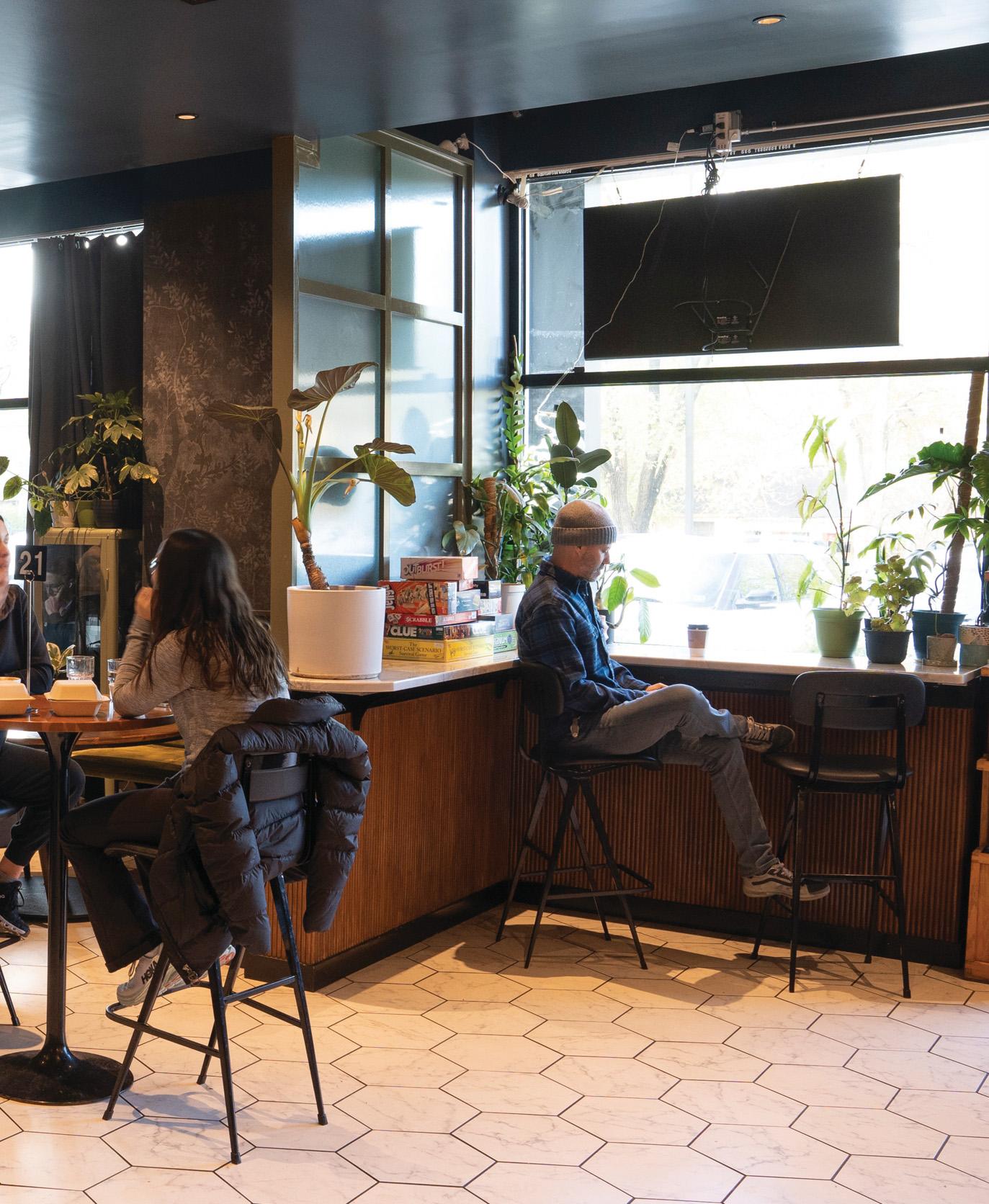
50 | WALTER The Optimist Raleigh
The best places for great food and beverages, according to the pros
WHERE to EAT&DRINK 2023
by CATHERINE CURRIN photography by BRYAN REGAN
From James Beard nominees to dive bars and everything in between, Raleigh holds its own in the culinary world. “There are so many amazing chefs and creative hospitality people in this town!” says Liz Porcelli, co-owner of The Raleigh Wine Shop, which has been pairing wines for Raleigh customers since 2011.
After a couple rocky years due to the pandemic, the food and beverage industry is ready for an upswing. “Between restaurants trying to reopen post-pandemic and Raleigh growing in general, I’m excited for a rebirth for Raleigh’s food scene,” says Porcelli. Andrew Ullom, owner of Union Special, agrees: “2022 was still a rocky ride! I hope that we get to see some stability and feel-good stories coming down the pipe. We all deserve that.”
The best thing we can do to support the scene is get out and enjoy it. For our annual Where to Eat & Drink guide, we’ve asked 12 chefs, bartenders and restaurateurs where to go for coffee, lunch, date night and everything in between. Because who knows better where to go for food and beverage than culinary folks?
If you’ve been on a hiatus from dining out the past few years, this list is the perfect way to get back into the rotation. Read on for more than 100 recommendations in Raleigh and the Triangle for a great culinary experience.
The Art & Soul of Raleigh | 51
JAKE WOOD
CHEF, LAWRENCE BBQ
CRAFT BEVERAGE: Gallo Pelón. “I order the Smokestack Lightning.”
CASUAL DRINK: Kotuku Surf Club
TAKE AN OUT-OF-TOWNER: Big Ed’s
COFFEE: Beyu Caffé at Boxyard
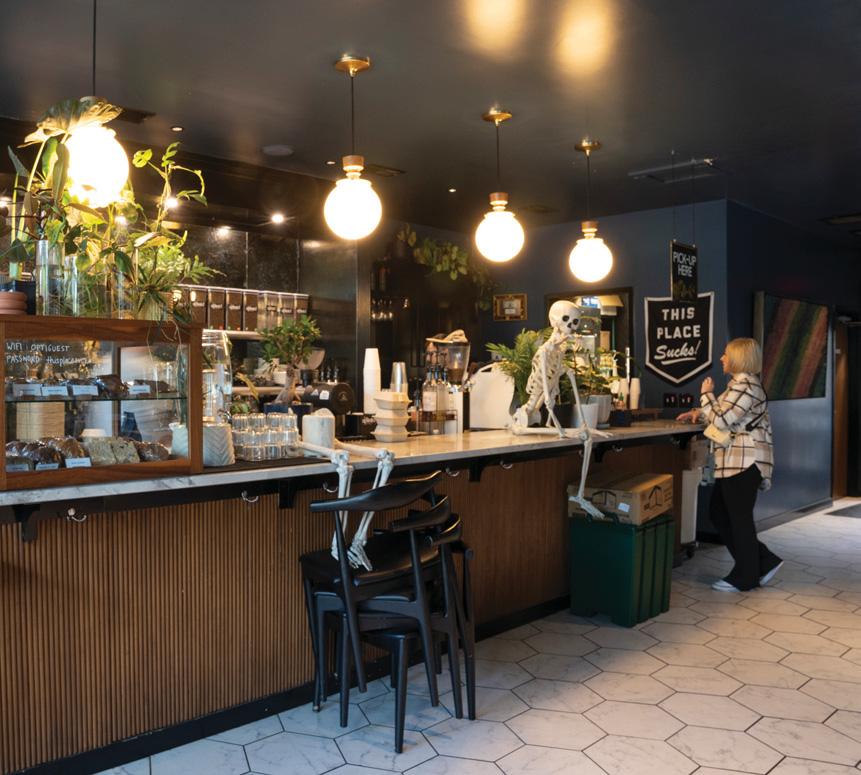
BRUNCH: Angie’s Restaurant in Garner
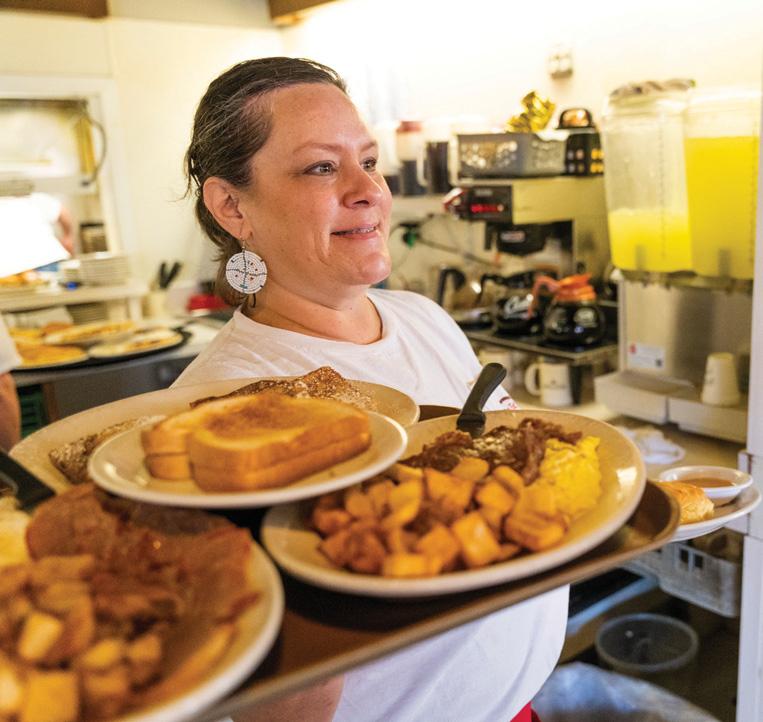
WORTH THE DRIVE: Jon G’s Barbecue in Peachland and Southern Smoke BBQ in Garland
MEAL TO-GO: Soo Cafe
LUNCH: Ideal’s Sandwich and Grocery. “Get there early!.”
INTERNATIONAL: Five Star Restaurant or Taqueria El Toro
DAVID MEEKER
CO-OWNER, TROPHY BREWING

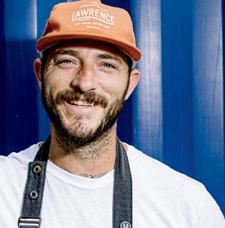
CRAFT BEVERAGE: The Longleaf Lounge
CASUAL DRINK: Person Street Bar
NEW SPOT: East Bower Cider Company
COFFEE: “My usual is The Optimist Raleigh. For good vibes, Pine State Coffee. For a to-go cup, 42 & Lawrence. For a work meeting, Sir Walter Coffee.”
BRUNCH: “Irregardless with family, Capital Club 16 for a Sunday fun-day, Beasley’s if we had a few drinks the night before.”
WORTH THE DRIVE: EX-VOTO at the Durham Food Hall
All head shots courtesy people shown.
Big Ed’s
52 | WALTER
The Optimist Raleigh
LIZ PORCELLI CO-OWNER, RALEIGH WINE SHOP


CRAFT BEVERAGE: Vault Craft Beer
DATE NIGHT: Death & Taxes
NEW SPOT: Longleaf Swine BBQ
TAKE AN OUT-OF-TOWNER: Stanbury. “It’s the most unique spot with a menu that’s always rotating and fresh!”
COFFEE: Layered Croissanterie.

BRUNCH: St. Roch
LAST MEAL ON EARTH: Chido Taco. “I love the quesabirria tacos.”
MEAL TO-GO: Gym Tacos
LUNCH: DeMo’s Pizzeria & Deli
INTERNATIONAL: Red Pepper Asian
LAUREN IVEY
EXECUTIVE CHEF, DEATH & TAXES
CRAFT BEVERAGE: Weaver Street
Market. “Great for a cold kombucha, iced coffee or sparkling water to go.”
CASUAL MEAL: The Players Retreat
NEW SPOT: Longleaf Swine BBQ


TAKE AN OUT-OF-TOWNER: Poole’s Diner. “Order anything and everything!”
COFFEE SPOT: lucettegrace
WORTH THE DRIVE: Hayashi Japanese Restaurant in Wake Forest
MEAL TO-GO: Mami’s Latin Style
Rotisserie Chicken
WEEKDAY LUNCH: (ish) delicatessen
INTERNATIONAL: Soo Cafe


OCTOBER 2018 | 91
The Art & Soul of Raleigh | 53
Layered Croissanterie
Mami’s Latin Style Rotisserie Chicken
“At Mami Nora’s, get the whole chicken, rice, black beans, and extra green and yellow sauce.”
– Lauren Ivey
LARZ ROBINSON OWNER, PINE STATE COFFEE
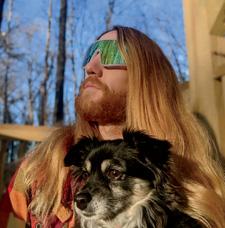
CASUAL DRINK: Wolfe & Porter. “Always and forever!”
DATE NIGHT: Element Gastropub or Five Star Restaurant. “My wife is vegan and they have excellent options.”
BRUNCH: Benchwarmers Bagels
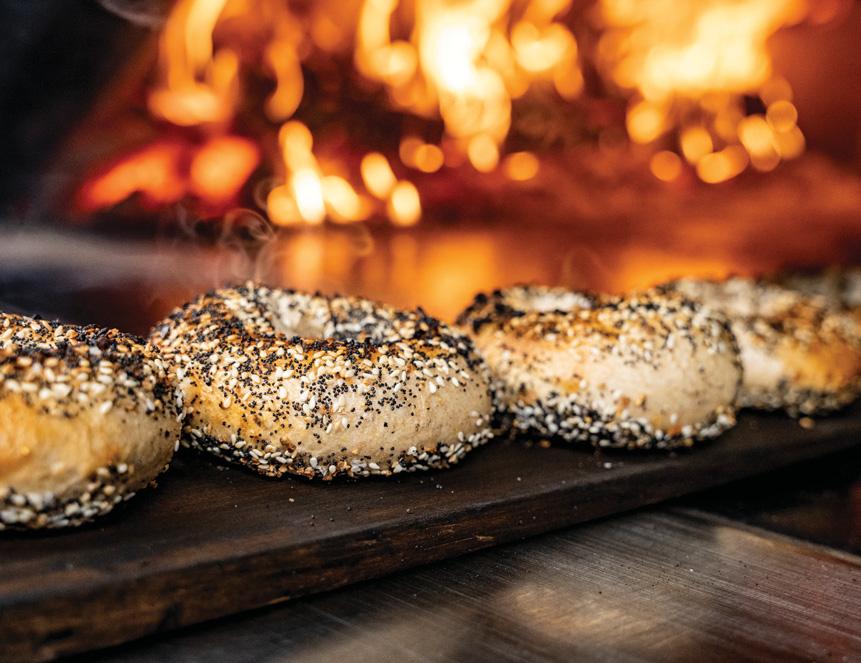
LAST MEAL ON EARTH: The Flying Saucer. “Nachos with chicken tenders, a taco pizza and a few rare pints!”
WORTH THE DRIVE: Plant Cakes Bake Shop, Wake Forest. “I’ll ride my bike the entire Neuse River Trail for them!”
MEAL TO-GO: AM.PM Burritos
RICKY MOORE
CHEF & OWNER, SALTBOX SEAFOOD

CRAFT BEVERAGE: Alley Twenty Six, Durham. “I order a Dirty Martini.”
CASUAL DRINK: Accordion Club, Durham
DATE NIGHT: Lantern, Chapel Hill
TAKE AN OUT-OF-TOWNER: Angus Barn

COFFEE: Beyu Caffé, Durham
BRUNCH: Guglhupf, Chapel Hill
WORTH THE DRIVE: Sweet Potatoes Restaurant and Miss Ora’s Fried Chicken in Winston Salem.
MEAL TO-GO: Bon Fritay Haitian Food Truck
INTERNATIONAL: Habibi Grill & Bakery, Sitti and Flame Kabob. “I love Lebanese and Middle Eastern food!”
54 | WALTER
left page: Forrest Mason (MOORE); Taylor McDonald (LANTERN); courtesy Larz Robinson (ROBINSON) right page: Eamon Queeney (ULLON); courtesy Josh Bellamy (BELLAMY)
Lantern
Benchwarmers Bagels
ANDREW ULLOM OWNER, UNION SPECIAL
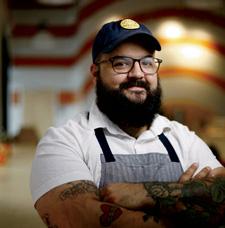

CRAFT BEVERAGE: Crawford & Son.
“Ask for a mocktail, dealer’s choice.”
CASUAL MEAL: The Roast Grill
DATE NIGHT: Seoul Garden
TAKE AN OUT-OF-TOWNER: St. Roch and The Players Retreat
COFFEE: Iris Coffee Lab
BRUNCH: “I recuse myself! Union Special Bread’s brunch slays all others.”
LAST MEAL ON EARTH: A cheeseburger from Fine Folk.
WORTH THE DRIVE: Tesoro in Carrboro

FOOD TRUCK: Gym Tacos
INTERNATIONAL: Chuan Cafe

JOSH BELLAMY CO-OWNER, BOULTED BREAD
CRAFT BEVERAGE: Stanbury. “Whatever wine Sydney Nazerian is stoked on. Or the Chocolate-Chai Hot Chocolate from Escazu.”
CASUAL DRINK: The Goat
COFFEE: Jubala
LAST MEAL ON EARTH: Char-Grill. “I’d order the double cheeseburger with mayo, mustard, chili and onions. Fries. A Pepsi. And a loaded hotdog.”
WORTH THE DRIVE: Ronni’s Restaurant in Clemmons
MEAL TO-GO: El Rey del Taco
LUNCH: Cold Off the Press
The Art & Soul of Raleigh | 55
Chuan Cafe
Stanbury
PREETI WAAS
OWNER, CHEENI INDIAN FOOD EMPORIUM
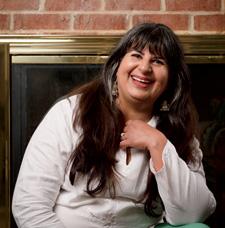
CRAFT BEVERAGE: A’Verde Cocina + Tequila Library, Cary
DATE NIGHT: Jolie
NEW SPOT: Glasshouse Kitchen, RTP
TAKE AN OUT-OF-TOWNER: Vidrio. “We’ve had some outstanding meals.”
COFFEE: NoRa Coffee
WORTH THE DRIVE: Bodega by Curate, Asheville
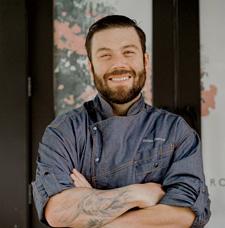
MEAL TO-GO: Lao Lao Food Truck
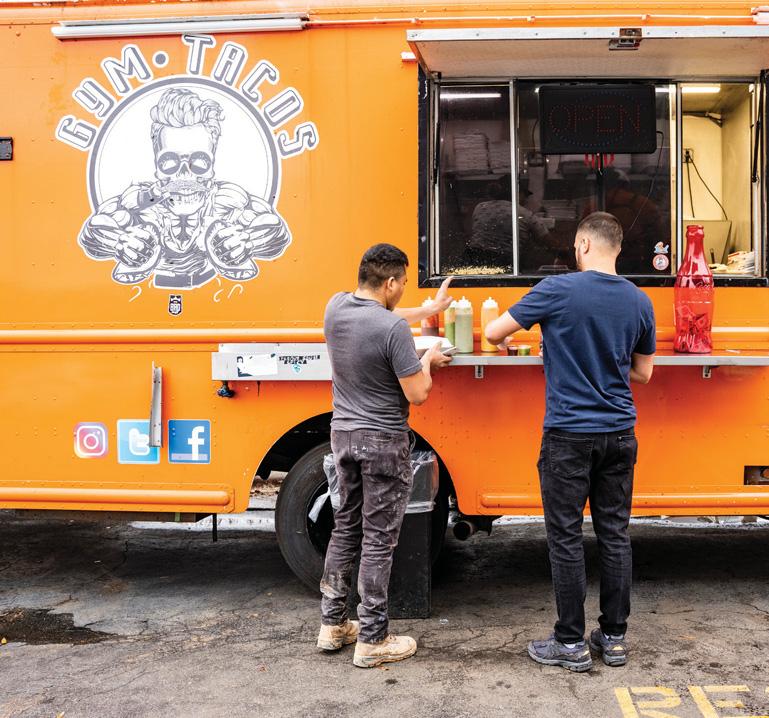
INTERNATIONAL: “This is a tough pick between Taipei 101 in Cary and Sizzlin Stir Fry Asian Bistro.”
BRIAN JENZER
EXECUTIVE CHEF, ROSEWATER
CRAFT BEVERAGE: Oak City Brewery. “It’s a great spot for a beer outside, especially with two kids.”
CASUAL DRINK: Mordecai Beverage Company
NEW SPOT: Krill, Durham
BRUNCH: Baker’s Dozen. “Their donuts are always fresh and amazing.”
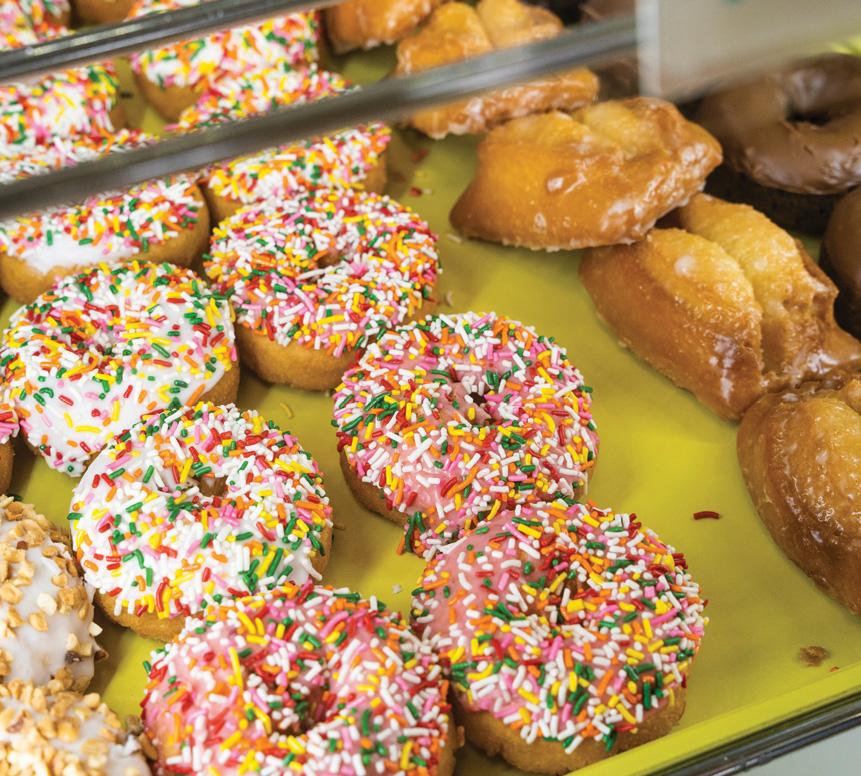
WORTH THE DRIVE: Poe’s Tavern, Wrightsville Beach.
MEAL TO-GO: Fu Kee Express. “There is one guy that takes your order and cooks your food. You better know what you want to order!”
left page: courtesy Preeti Waas (WAAS); courtesy Brian Jenzer (JENZER)
right page: Baxter Miller (JESSIE ROSSABI); courtesy Lindsay Rice (RICE); Jillian Clark (OAKWOOD PIZZA)
56 | WALTER
Gym Tacos
Baker’s Dozen
LINDSAY RICE OWNER, VITA VITE

CRAFT BEVERAGE: Standard Beer + Food
CASUAL DRINK: High Park
TAKE AN OUT-OF-TOWNER: Cortez. “It’s a great place to show off the diversity of Raleigh’s food scene.”
BRUNCH: Neuse River Brewing
NEW SPOT: Cuya. “I can’t wait to try the cocktail program they’re building.”
WORTH THE DRIVE: Mother & Sons in Durham. “Love the cacio e pepe.”
MEAL TO-GO: Oakwood Pizza Box

LUNCH: Wilson’s. “Great place to sit at the bar and do work.”
INTERNATIONAL: MOFU shoppe
JESSIE ROSSABI BARTENDER, THE WILLARD ROOFTOP LOUNGE

CRAFT BEVERAGE: Dram & Draught. “I love the Mezcal Old Fashioned.”
DATE NIGHT: Ajisai
NEW SPOT: 321 Coffee
COFFEE: Jubala. “Friendly folks, daily visits recommended.”
WORTH THE DRIVE: Mezcalito, Clayton. “They have a crazy menu and super fun cocktails, fantastic value.”
MEAL TO-GO: Gym Tacos. “It’s family run, authentic Mexican street food.”
LUNCH: Morgan Street Food Hall.
INTERNATIONAL: Five Star. “A staple!”

OCTOBER 2018 | 91
The Art & Soul of Raleigh | 57
Five Star
Oakwood Pizza
FLOW &EBB
 by
by
J






 OHN GESSNER
OHN GESSNER
photography by HOLDEN RICHARDS
 A photographer captures the ever-changing Eno River with an antique camera through a meditative practice
A photographer captures the ever-changing Eno River with an antique camera through a meditative practice
58 | WALTER
The Eno River is named for the Native Americans that lived and traded along its banks. It swiftly winds through 40 miles of Orange and Durham counties. And if you have visited the Eno on any given day during the past 10 years, chances are you’ve spotted a lone photographer in the middle of the river, a tall man wearing glasses and a baseball cap. That would be Holden Richards, a self-taught fine art photographer and master printer.
His camera of choice is a rare, 125-yearold Ak-sar-ben 8x10 view camera. “The camera chose me; it was offered for sale by someone who thought I might put it to good use,” says Richards. “I’ve been lucky that way.”
Vintage cameras have an aura of sorts: they are survivors. Simply built of wood, metal and glass, there are no high-tech bells and whistles to distract you from the task at hand — or to offer a shortcut to a better photo. These old view cam-
eras are just ground glass, bellows and a shuttered lens.
These cameras are heavy, cumbersome and require extensive knowledge and training to properly use them — and that’s just to properly expose a sheet of film. The printing takes as much patience and practice to master. (Many photographers hire photographic printers so they do not have to tackle another skill set.)
Richards has mastered both by tenacious trial and error. He has whittled down the essence of shooting successfully and efficiently so he can get to the right spot on the river, at the right time of day, and focus on the ever-changing beauty of the Eno River. “I only know what I want to shoot when it comes into view,” he says. The endless variation of light on the scenery will pique his interest, causing him to pause and expose a sheet or two.
To do this, Richards is often traversing to the middle of the river, carrying 20 pounds of equipment on his back. And while a typical film camera allows 36 exposures per sheet, these cameras can

only hold two exposures at a time. “With an 8x10 camera, if you find four scenes worth your time and effort — and make those four exposures successfully — you’ve had a very good day,” says Richards. He uses his hand and lens cap as the shutter, his brain as the timer.
He’s brought this endurance, persistence and creativity to the Eno over the past 10 years. Richards has walked almost the whole trail system, but certain spots catch his attention time and time again. Few’s Ford, Cole Mill and the Cabelands sections of the river have intriguing topography, geology and forests. He tends to get attached to a certain turn in the river or a particular tree. “I go visit them like old friends,” he says. Over thousands of sheets of film, Richards has generated intensely beautiful images, many of which are gathered in a book called Riverwalk, which Richards self-published in 2021. A few images from his book are showcased on the following pages.
Richards studied painting and composition at the University of North Caro-
The Art & Soul of Raleigh | 59
Holden Richards with his camera. Opposite page: PumpstationRock and Flow.
“No man ever steps in the same river twice, for it’s not the same river and he’s not the same man.” — Heraclitus
Will Richards
lina at Chapel Hill, but went on to a career in computer programming. He was always looking for a way to get back into composition and found that the camera was a natural way to do that. His observations of the visual art that preceded photography became the basis of how he practices his photographic work. “I have always tried to let some of that aesthetic inform the process,” says Richards.
When Richards moved to Hillsborough 23 years ago, he often walked the open lands and rivers of Orange County. His work-at-home career, spanning 30 years, allowed him to take daily walks. It became obvious to him that the Eno was essential to the town’s growth, formation and zeitgeist. “I walked it daily. It was a natural subject for me as I didn’t want to be a portrait photographer or deal with man-made anything compositionally,” says Richards.
He started with photography in his 40s. To learn the craft he attended the Penland School of Craft to study View
Camera with Jim Stone, a visiting professor from the University of New Mexico, which helped pull his workflow into focus. Richards also sought out the previous generation of film photography masters in North Carolina, specifically John Menapace, Elizabeth Matheson, John Rosenthal and David Simonton. This group of well-seasoned artists helped Richards with practical and fundamental questions about the processes and equipment needed to be successful in film photography. Over time, they reviewed his evolving portfolio. “Their collective experience was invaluable to me because I had few peers locally doing film photography seriously,” says Richards.
Richards first mastered the 35mm camera, the easiest to handle and have developed. Then he moved up to medium-format film and cameras. “I had been printing 35mm in the darkroom getting good results, but after printing images from rolls of medium format film I saw the improve-
ments in tone and detail immediately,” says Richards. Then he made the leap to the Big Kahuna of large format photography, the 8x10 view camera. This format would allow him to contact-print larger images, rather than losing resolution to make a printed photo bigger. “I was dreaming of rich contact prints even in my earliest stages of learning large format,” he says. “Turns out the transition wasn’t as easy as you would think. It’s just suddenly there are 10 inches of glass in the viewfinder versus 2.”
Between the walks to find his vantage points and the arduous work of capturing the images, Richards’ photographic project along the Eno has become a meditation of sorts.
“Using a large antique film camera creates a need for going slow, for being intentional. It’s all manual,” says Richards. “It means I observe everything, take it all in — mind and body cooperate in the creation of these images.”

60 | WALTER
John Gessner
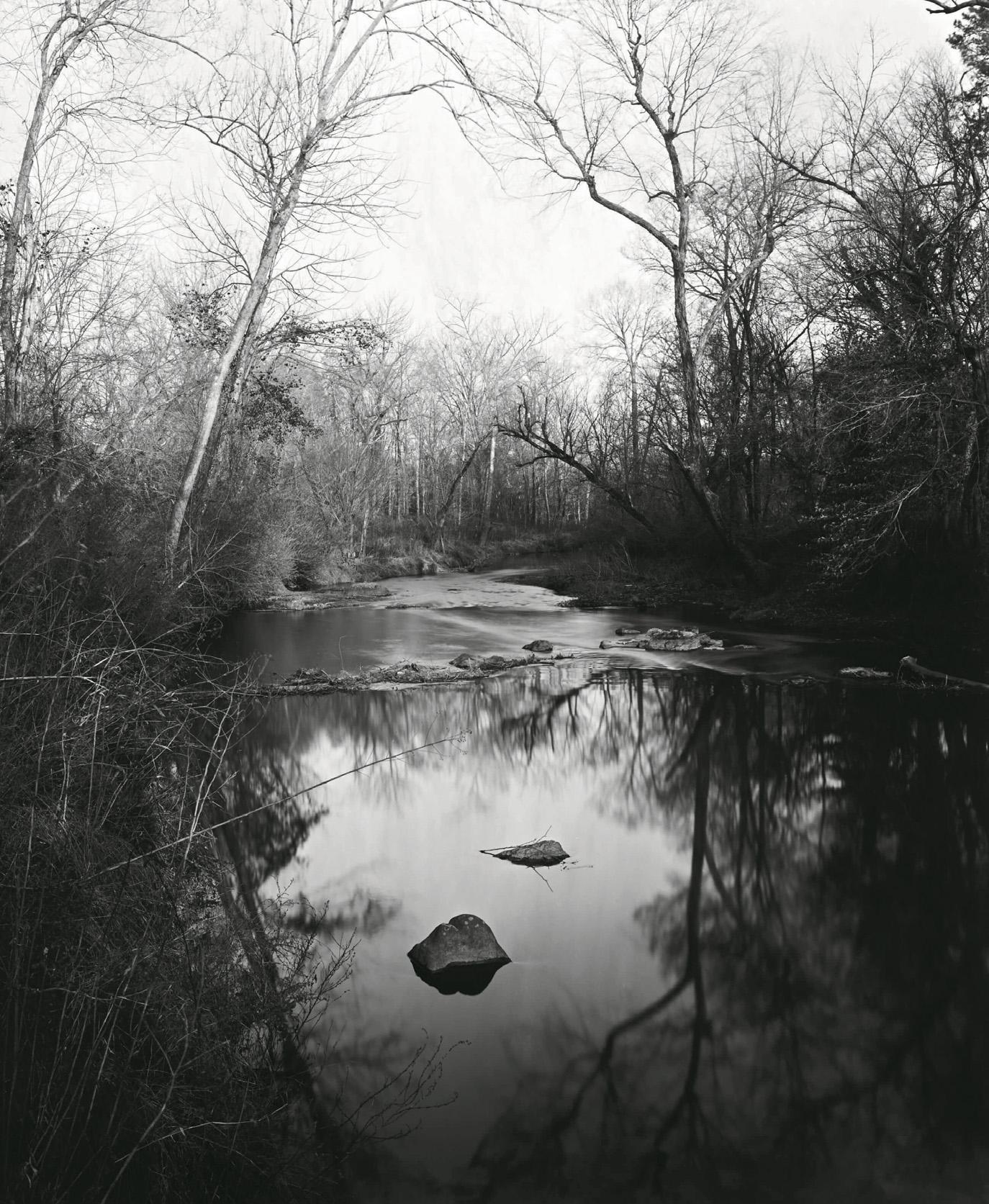
The Art & Soul of Raleigh | 61
Eno - River Bend
Opposite: Holden on the Eno River, taking a photograph.


62 | WALTER
Few’s Ford - Root in the Rock
Cole’s Mill


The Art & Soul of Raleigh | 63
Toward Holden’s Mill
Nancy Rhodes CreekSunlit Ferns

64 | WALTER
Riverwalk, Twilight Opposite page: Riverwalk, North.


The Art & Soul of Raleigh | 65
“The camera chose me… I’ve been lucky that way.”
–Holden Richards


66 | WALTER Bridge Path
Ice Islands. Opposite: Riverwalk, Snow
“I observe everything, take it all in — mind and body cooperate in the creation of these images.”

The Art & Soul of Raleigh | 67
— Holden Richards
A Chapel Hill home blends tastes and family functionality with luxurious touches
COOL HUES
by AYN-MONIQUE KLAHRE
photography by CATHERINE NGUYEN
OPEN & AIRY

The kitchen is the hub of the home for this young family. Designer Michelle Murphy painted the island a blue-gray as a nod to coastal style and put in cleanlined lighting and hardware for a more modern feel. Deep, comfortable bar stools are a spot for the kids to perch for casual meals. “The kitchen is just bright and airy,” says Murphy. “This space is heavily used, but it still feels luxurious,” says the homeowner.
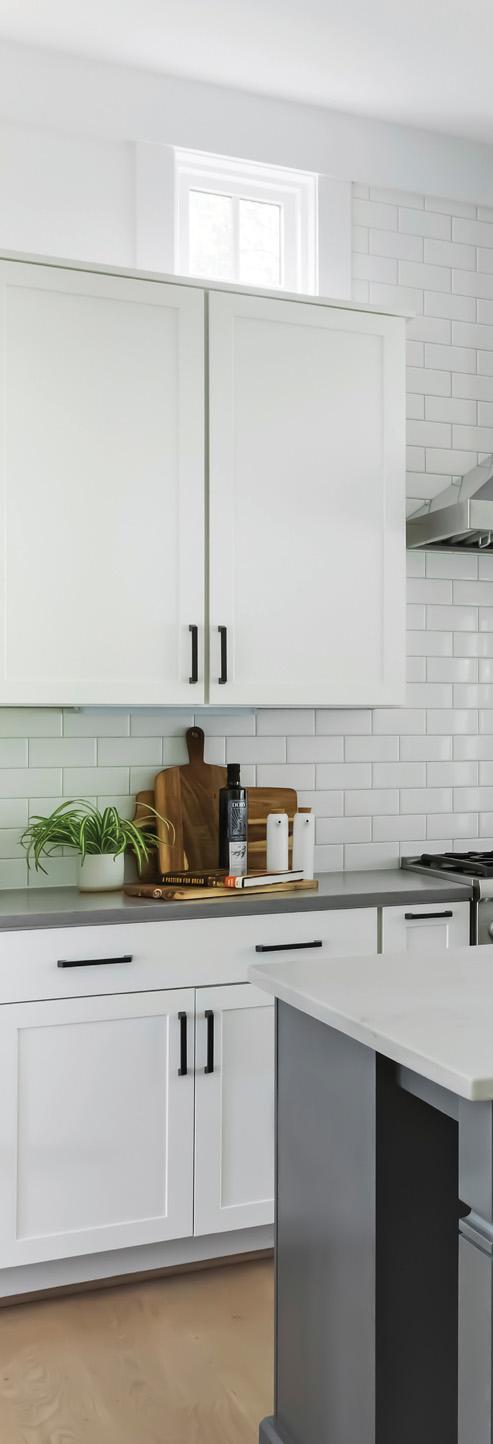
68 | WALTER

The Art & Soul of Raleigh | 69
When a young family found this four-bedroom home, built in 2018 on a generous lot in an older neighborhood in Chapel Hill, it was farmhouse modern, through and through. The house was spacious and practical, but the rolling barn doors and shiplap weren’t exactly their style. “We loved that the house was newly built and had 10-foot ceilings, but we knew we wanted to minimize the farmhouse look,” says the homeowner.
That said, the couple has different design tastes. The husband’s sensibilities lean industrial modern, while the wife prefers a more traditional, coastal-preppy look. But both knew they wanted a space that would feel lush and comfortable while being functional for their two preschool-age daughters. “We want the kids to be able to enjoy the entire house, so we need furnishings that are beautiful, but still work for our lifestyle,” says the homeowner.
They enlisted designer Michelle Murphy of Demi Ryan to update the home, bridge their tastes and decorate the interiors to work for their family. They chose Murphy because of her ability to create a modern, luxurious style. “All of the spaces she creates looked pulled together, but also liveable,” says the homeowner.


“We had to find the happy medium,” says Murphy — between the couple’s different styles, the needs of the family and the bones of the home. She found the compromise in a palette of white, gray and navy, an industrial-modern base that incorporates coastal nods. Murphy swapped in new lighting and hardware throughout, then outfitted each
FAMILY STYLE
“This is where we get together for family dinners,” says the homeowner of the breakfast nook. “Our girls are still too young to last very long at the table, but they can get down after a meal and play beside us.” They skipped the window treatments here because the back of the house faces the backyard of their ¾-acre lot, with no neighbors in sight.
70 | WALTER
ROOM FOR ALL
Across from the kitchen is the family room. It’s outfitted with a deep couch, swivel accent chairs, ottomans and a broad coffee table — all chosen with the idea of making it an easy space to hang as a family or with friends. An elegant credenza hides the girls’ toys. “This is such a warm space; it’s definitely the most-used space by all our family members, but it still feels sophisticated,” says the homeowner. “The coffee table hosts many tea parties for the girls’ stuffed animals — but the room has also been great for watching a football game without feeling too crowded.”


The Art & Soul of Raleigh | 71
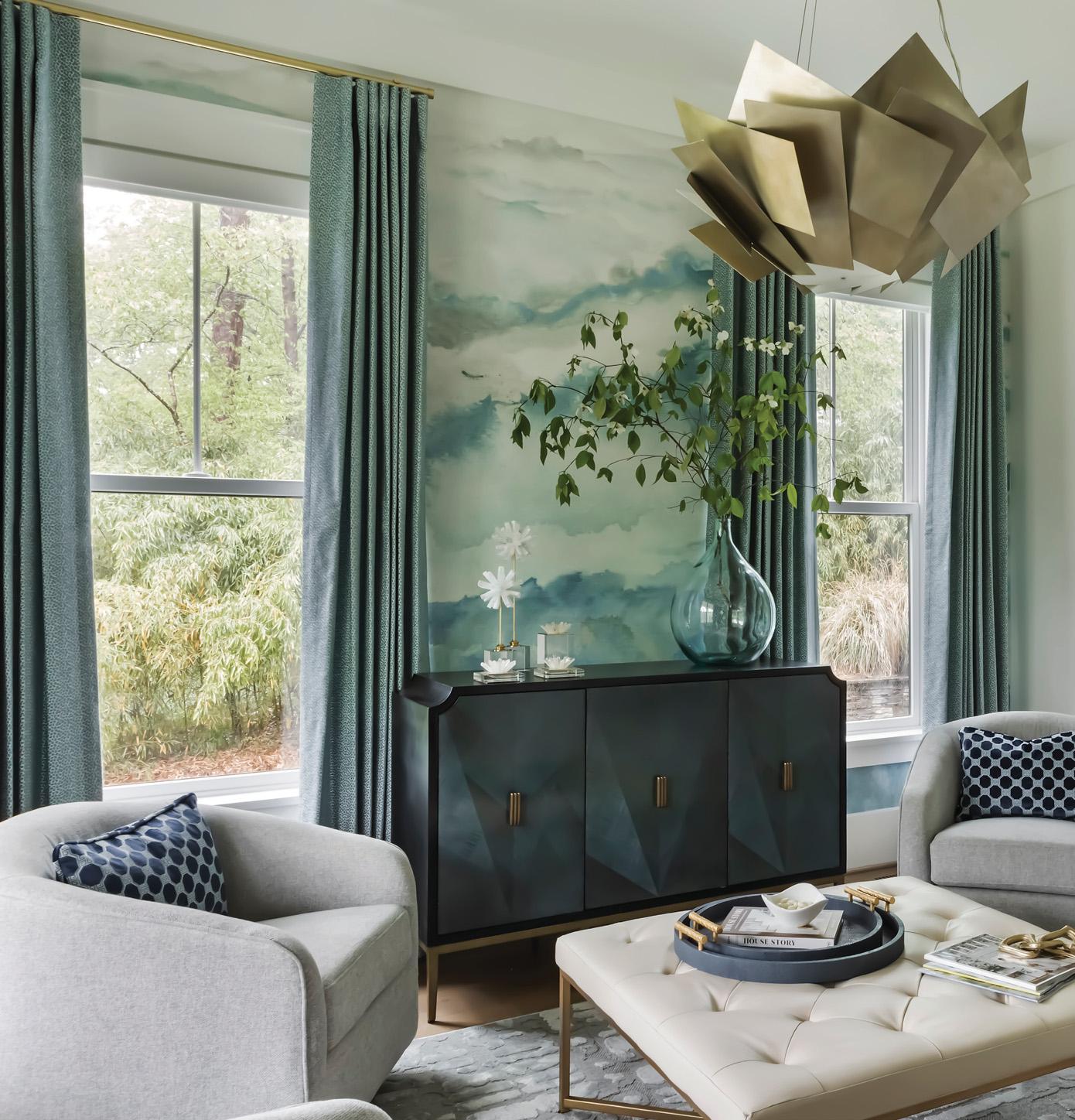
60 | WALTER 72 | WALTER
FOCAL POINT
Just inside the front door on the left, a watercolor accent wall commands attention. “We wanted a pop of something unexpected,” says Murphy. “It’s a real Wow! moment when guests see it for the first time,” says the homeowner. “And it still feels special even now that we’ve lived here for a while.” There’s intentionally no television in this room. “This is where we have conversations and play games with no distractions,” says the homeowner.
space with clean-lined furnishings. She used fabrics like velvet, leather and shearling in the curtains, pillows and upholstered furniture to offer both comfort and a plush feel, and metallic accents in every room to give each space a hint of glamour.
Throughout the home, Murphy worked to create functionality for the family. “The house does not have great storage, so we were strategic about including pieces like the credenzas in the living room and family room that could hold toys for the kids in an attractive way,” says Murphy. The butler’s pantry, which links the kitchen to the front sitting room, has one side designated for
wine and dinner drinks and the other for breakfast items. “An uncluttered kitchen is key for a stress-free morning, and the butler’s pantry does all the heavy lifting for us,” says the homeowner. “This is where we house multiple coffee makers, two beverage fridges and our overworked Vitamix.” And while the furniture looks lavish, all the seating is done in stain-resistant fabrics, and the wide coffee tables are sturdy enough to act as a stage for an impromptu performance.
Throughout the home, Murphy repeated tones of blue to make it all feel pulled-together, from teal curtains in a tiny leopard print in the front room, to deep-blue velvet chairs in the breakfast nook, to navy credenzas in the primary bedroom.
“The spaces that Michelle created look like they belong in a luxury hotel and feel special every time we use them,” says the homeowner. “She blended each of our styles perfectly in our home.”

The Art & Soul of Raleigh | 73
“The house does not have great storage, so we were strategic about including pieces … that could hold toys for the kids in an attractive way.”
— Michelle Murphy
LUXE RETREAT


In the primary bedroom, hand-painted crystal wallpaper gives the space a cozy feel. “I love retreating to this bedroom in the evening and seeing the wallpaper behind the bed shimmering — it sets the tone for winding down after a long day,” says the homeowner. Murphy continued the blue accents from downstairs with navy nightstands and incorporated soft textures like the velvet curtains and juju headdress hanging above the bed. Off the bedroom, the primary bath, right, is done in clean, neutral tones and continues on to a his-and-hers closet. From the closet, another door leads to the hallway — a quirky but convenient touch so that one person can get ready for an early-morning workout without waking the other.

74 | WALTER
NEUTRAL TONES
In the corner of the primary bedroom, a plush chair and layered sheepskin rugs create an inviting place to wind down with a book. “I feel a sense of serenity when I walk in here,” says the homeowner. “You feel like you are walking into a boutique California hotel on your first day of a vacation. It’s an oasis from the rest of our noisy, child-filled home.” That’s just what Murphy was going for: “To me, this is always the most important room to get right, because you want to be able to rest and be comfortable.” In the first-floor office, left, Murphy balanced the white shiplap wainscoting with black paint to tone down the farmhouse feel. The room was designed with a large built-in desk for the kids to do their homework when they’re older, but these days it mostly serves as the husband’s office.



The Art & Soul of Raleigh | 75
ROOM TO GROW
“This may be a space for a little girl, but it could not be more stylish!” says the homeowner of her younger daughter’s room. “I love the modern, but fun, colors that will grow with her as she gets older.” In both girls’ rooms, built-in benches create window seating with storage underneath. “They love these window nooks and the ‘secret’ libraries stored underneath their seating,” says the homeowner. In the laundry room, right, peppy wallpaper and a floral shade make the utilitarian room feel special. “This is the most cheerful laundry room I’ve ever seen — it’s actually enjoyable to spend time here!” says the homeowner.



76 | WALTER
POP OF COLOR
The homeowners designed each of the kids’ rooms and surprised their daughters when they moved into the home. “The joy on their faces during the ‘reveal’ made it clear that these were easily going to be their favorite spaces in the home,” says the homeowner. The girls’ bedrooms are connected by a Jack-andJill bathroom, with the vanity lacquered a hot pink. “We thought we could have a little fun with it, since it’s just the two girls sharing the bathroom!” says Murphy.


The Art & Soul of Raleigh | 77
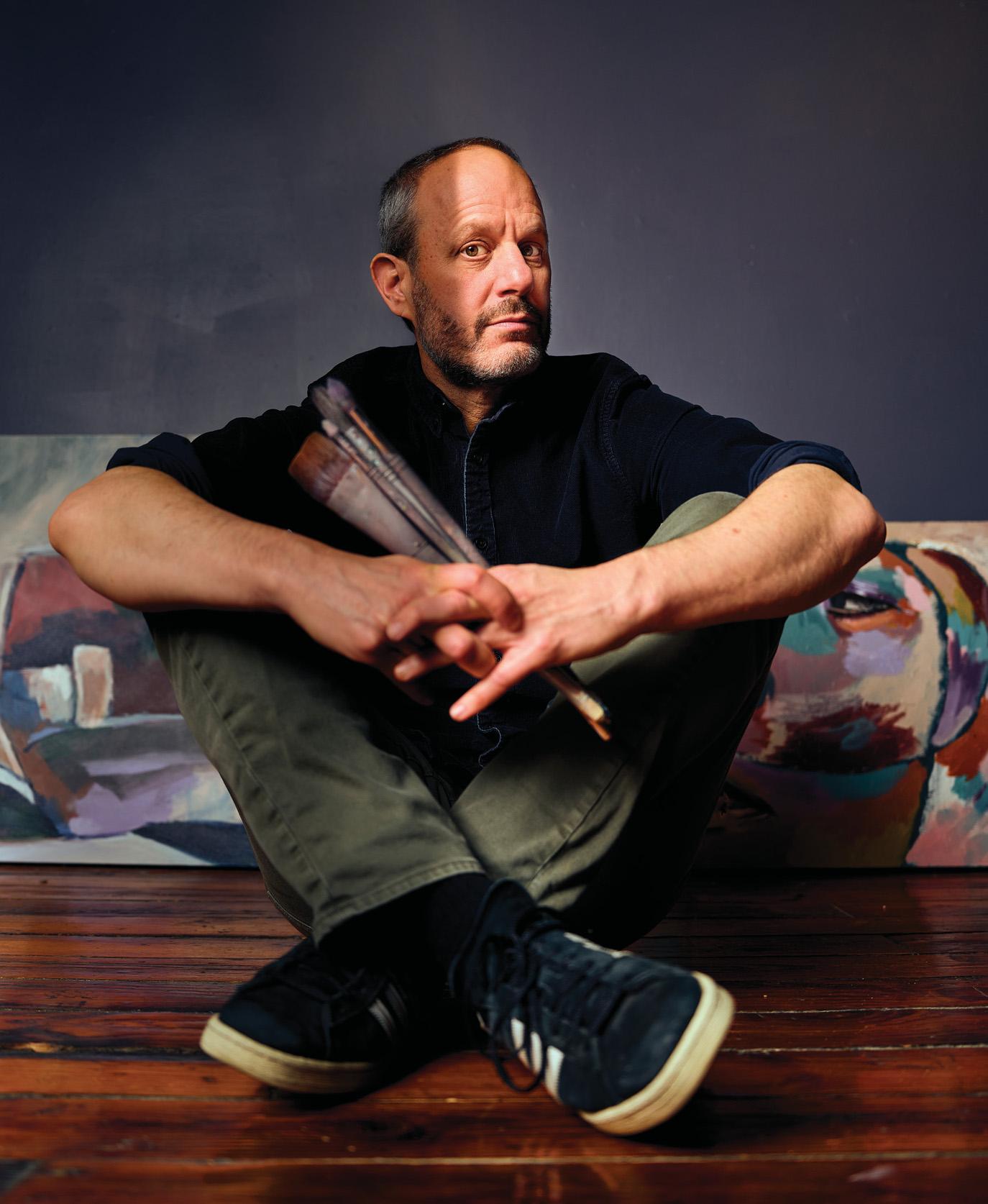
78 | WALTER
Withdeftbrushstrokes, AdamD.Cohenrevealsthe mysteryinsidehissubjects











 by
GARRETT BETHMANN
photographyby JOSHUASTEADMAN
by
GARRETT BETHMANN
photographyby JOSHUASTEADMAN
The Art & Soul of Raleigh | 79
go figure
Iwish I dreamt in the way that an Adam D. Cohen painting looks. Walking through the artist’s downtown Raleigh studio at Artspace on a calm Wednesday morning, I’m moved by the big colors, kinetic lines and gloriously distorted figures that vibrate off the wall. Faces percolate in puddles of color and scenes twist in spatial idiosyncrasies — they hint that the laws of time and space are merely suggestions. I feel a striking emotional connection to them.
“I’m painting characters from the inside out. These distortions take on a metaphorical and symbolic feeling,” says Cohen. “I’m toggling between the realism you see on the surface and the abstract mystery that is under the surface of every single person.”
He tethers together abstraction and realism in his portraits, and his tech-

niques and modalities are as varied and of the moment as the human experience. Cohen’s subjects are created from observations and admiration of different figures in real life, paintings or photographs that catch his eye. “All of those sources are just fodder for conjuring entirely new people, with their own stories — stories that can only be known through the projections of the viewer. They’re essentially Rorschach tests,” says Cohen.
Cohen first learned about how exaggeration and characters could tell a story when he interviewed Pulitzer Prize-winning cartoonist Doug Marlette of The Charlotte Observer in the sixth grade. (The two stayed in touch, and Marlette even helped Cohen get several of his editorial cartoons published as a teenager.) Cohen’s heroes were illustrators inspired by cartoons and Impressionism, which gave him a starting point on his own artistic
journey. “That is all about stretching the figure, distorting the figure, and that has made its way into my painting,” he says. “I saw a lot of fine art that did that and I realized, Oh, you can do this.”
Over the years, Cohen’s had a wide variety of career opportunities — but each has had a creative thread. He’s worked in corporate advertising, had a hand in recording short film projects (he entered a few into festivals, but found the process “too long and expensive”); entertained crowds as a stand-up comic (he was a regular at Goodnights Comedy Club and Kings in the early 2010s); and co-created an animated pilot for Adult Swim (“It was about a cereal mascot named Major Flake and all the other mascots who worked at Soggy Cereals, Inc.” — but, alas, it didn’t get picked up).
As such, Cohen’s artistic vision has never seemed to develop into any one
80 | WALTER
Adam D. Cohen works on a portrait of Sir Walter Raleigh for the January cover of WALTER.
“All of those sources are just fodder for conjuring entirely new people, with their own stories — stories that can only be known through the projections of the viewer. They’re essentially Rorschach tests.”
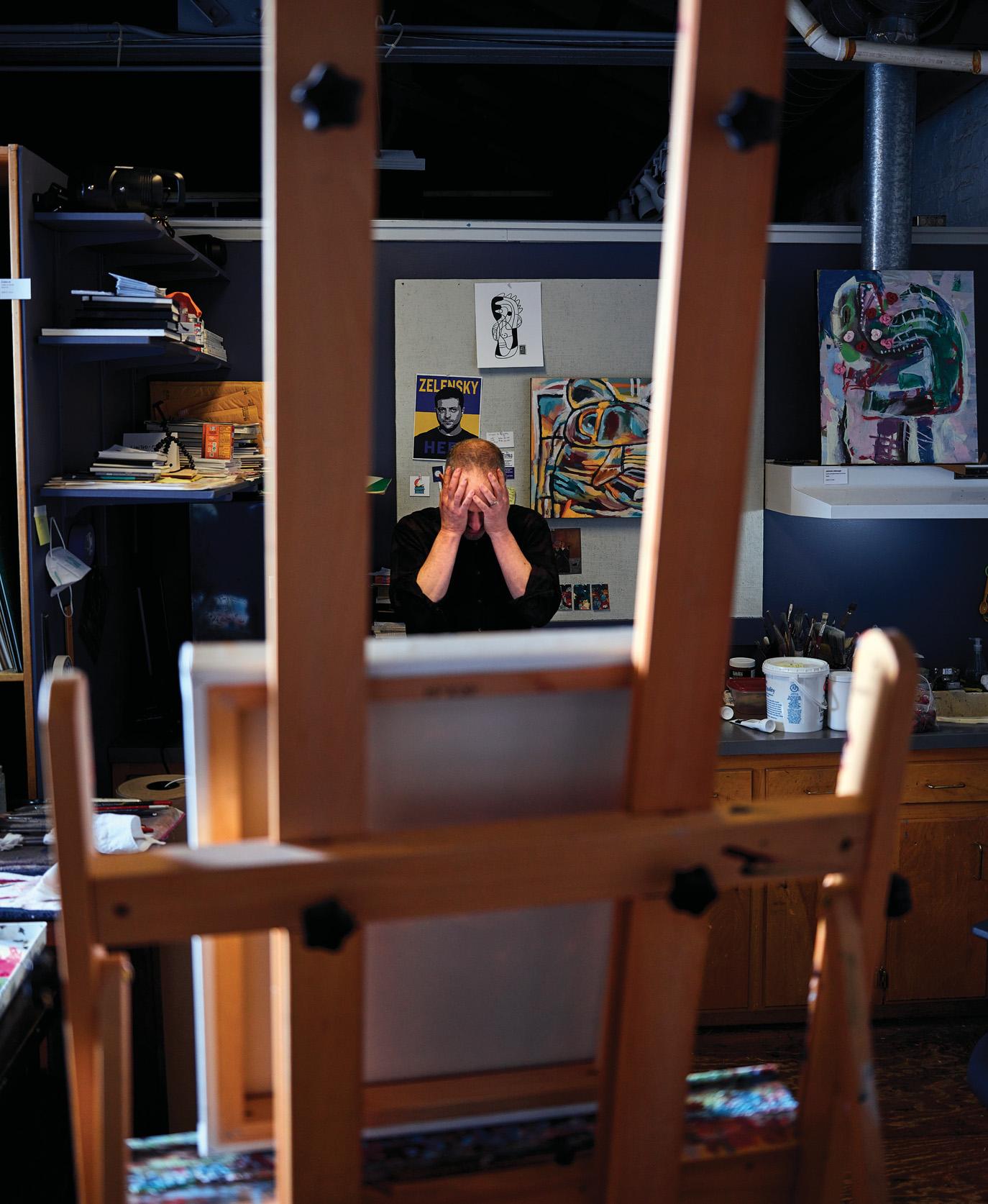 —Adam D. Cohen
—Adam D. Cohen
The Art & Soul of Raleigh | 81
style or mode, which was something he initially felt unsure about. “I didn’t show my work for decades because I hadn’t picked a style. I realized that maybe my style does not have one style,” says Cohen.
Cohen’s art comes in myriad modes and textures, from dizzying pen drawings to charcoal screeds to fantastical oil canvases. But in all of them, Cohen interprets the human figure to open up a dialogue between the conscious and subconscious.
“What it all has in common is that you are seeing that subterranean aspect of people bubbling up, but you have these realistic handles that orient you,” he says. “Your eye goes between trying to figure the abstract stuff out, with the handles that give you a clue, and it engages you physically, and unwittingly, emotionally.”
Artspace creative director Annah Lee says that Cohen’s interpretation of the human figure is distinctive, even for a city with artists like Alia El-Bermani, Shaun Richards and Pete Sack operating in similar form. “Adam’s use of the figure is something different. He’s combining
abstraction with figurative work,” says Lee. “It’s a joyful perspective to the conversation.”
Caitlin Cary, owner of The Pocket Gallery as well as a Cohen painting from his recent “Covers” series, agrees that he is bringing a fresh perspective to Raleigh’s art scene. “Adam has the spirit of a cartoonist in a very fine and very serious painter. There is an ease in capturing a gesture or a face that feels fast,” says Cary. “It’s inviting and inscrutable.”
One reason Cohen’s work is so inviting is that his various styles can appeal to a lot of different perspectives. “I find that no matter how far I go in any direction stylistically, there is someone out there for it. It may turn off some people, but it wakes up other people who weren’t necessarily turned on by what I was doing,” says Cohen.
That range and need to try different things is exactly why Cohen likes to create in the moment. “My natural inclination is to go to surprises and to not repeat myself, to have the moment at the edge
of the cliff where you don’t know what this thing is, and to then resolve it. That’s what I get a real high from, walking that tightrope,” says Cohen.
To exemplify this approach, he reveals three versions of this month’s WALTER cover in various states of completion, each using the same color palette of maroons, blues, greens and yellows. One dabbles in light Cubism with saturated pockets of color, another bounces off the canvas as a joyful caricature and yet another stands refined in bright washes and wisps of oil paints.
His technique is rooted in a desire to work quickly and intuitively. “My formal tools and techniques align with my larger goal of ‘getting out of the way’ of the work as much as possible, letting something happen ‘through’ me rather than being so controlled ‘by’ me,” says Cohen.

Any piece of his work can incorporate different dashes and splashes of color and style as he moves at the speed of spontaneous creation. “Working improvisationally helps that happen, and is a big reason I use acrylic paint, which dries faster than oils, giving me the ability to quickly respond to what’s taking shape — altering forms, color distribution, changing direction completely,” says Cohen.
To amp up the interaction of abstract tones and human forms, Cohen uses unnatural color palettes. “I feel it helps the images live in a less literal, more symbolic/archetypal space. This approach to color is definitely influenced by Fauvism, Post-Impressionism and German Expressionism,” says Cohen.
To Lee, Cohen’s continuous evolution and stylistic change is one of his most appealing features. “From day to day he’s always pushing himself and pushing new ideas,” says Lee. “There’s this sort of cohesion. He’s an artist that is always playing with different ideas and it brings a fresh perspective.”
“It’s collaborating with something bigger than me. A lot of it I don’t know what it is going to be when I start off painting,” says Cohen. “You can see the layers and you don’t need to understand or know the history, but when you pick up on it, there is this depth.”
00 | WALTER
82 | WALTER
Cohen works on another version of Sir Walter Raleigh.




The Art & Soul of Raleigh | 83
Clockwise from top left: Stella; It Never Enters My Mind; Bathhouse (After Serebriakova); For Pam.
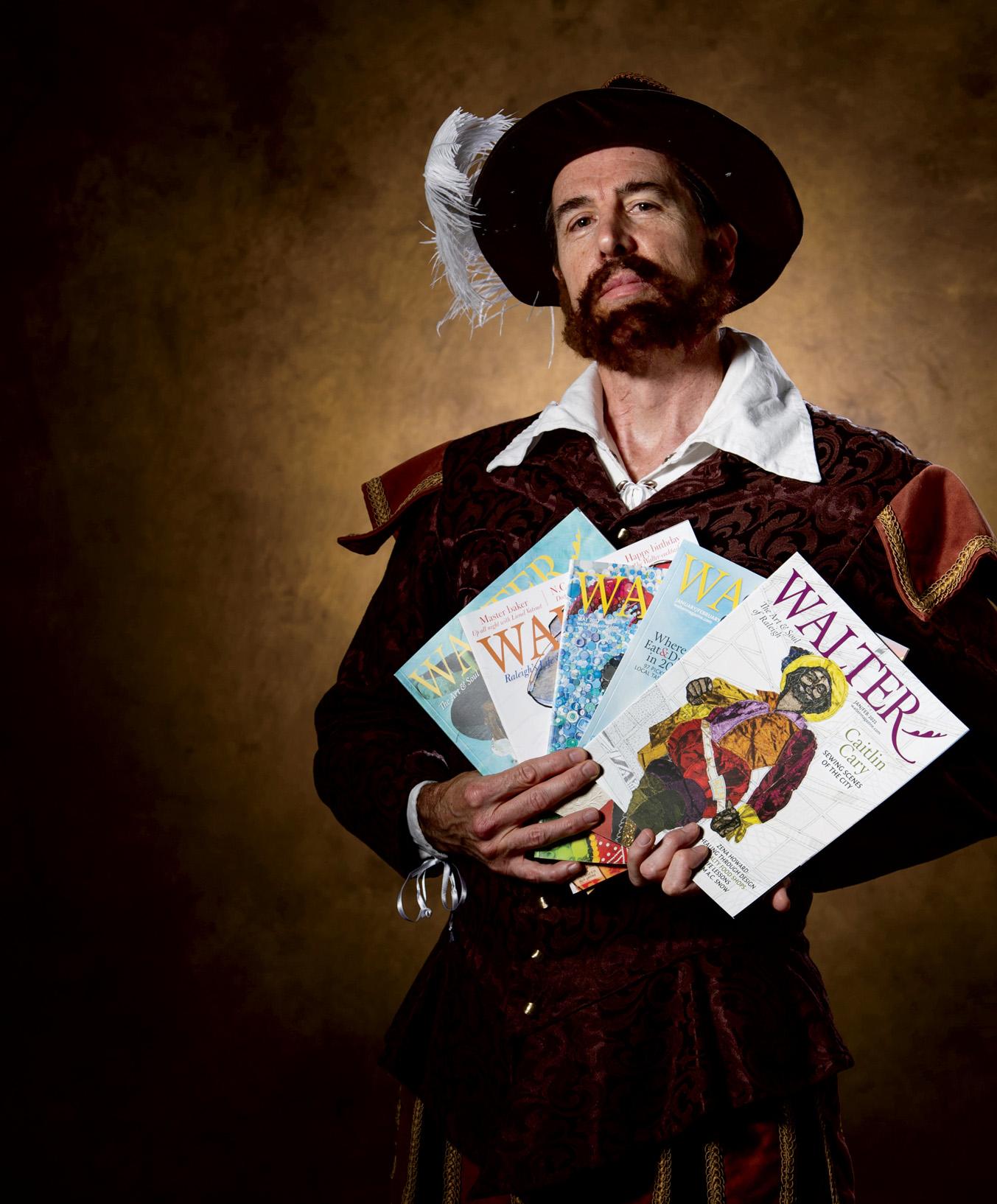

SUBSCRIBE TODAY 12 ISSUES PER YEAR 1 YEAR $25 2 YEARS $45 3 YEARS $60
“Nothing could be finer.”
- Sir Walter Raleigh
THE WHIRL THE WHIRL

86 Celebrate the Season 88 Women on a Mission Dinner 89 Holiday Magic 89 Evening of Hope Gala 90 Sizzling Shakespeare 91 NCMHF Philanthropy Awards 92 Bailey’s Fenton Grand Opening 93 Beaufort Fall Party 94 An Afternoon with Miss America
have your event considered for The Whirl, submit images and information at waltermagazine.com/submit-photos The Art & Soul of Raleigh | 85
To
roundup of gatherings, celebrations, fundraisers, and more around Raleigh.
Matt Ramey
WALTER’s
WALTER’s Celebrate the Season
CELEBRATE the SEASON
On Dec. 7, WALTER hosted its annual Celebrate the Season event at Raleigh’s Union Station. This festive night gathers local makers and retailers for an evening of holiday shopping while enjoying jazz music, refreshments and the lively downtown skyline.






This year’s Celebrate the Season was sponsored by WILDERS and Main & Taylor Shoe Salon. The Al Strong Trio played sweet holiday tunes, and guests relaxed in the Green Front Lounge. Catering Works provided food that featured pasture-raised pork and Wagyu beef from WILDERS, and the beverages were provided by Lonerider Spirits, Lonerider Brewery and Westgate Wine.
Guests had plenty of options to check everyone off their Christmas lists. The vendors included Addis Jemari, America’s Best Nut Company, Autumn Cobeland Art, The Bath Place, Benevolence Farm, Boho Beads, Cornelia Home, Crude Bitters, Designed For Joy, Ella’s Popcorn, The Flourish Market, Gather Goods Co., Hampton Farms, If It’s Paper, The Kitchen Apothecary, Laura Korch, Logan’s Garden Shop, Main & Taylor Shoes, Nazz Ares, NCMA, New South Pattern House, Nons Salts, One and Only Paper, Papermill Creative, Peppertrain Jewelry, Pet Wants, Seton McGlennon, Sweetgrass Home, Usu Company, Ware Ware Studio and WILDERS.
Matt Ramey
86 | WALTER
WALTER EVENTS
Al Strong Trio
Guests at Celebrate the Season
North Carolina Museum of Art Drinks by Lonerider Spirits, served by On My Way Bartending
America’s Best Nut Company
Crude Bitters
Guests enjoy Celebrate the Season








The Art & Soul of Raleigh | 87
Usu Company Seton McGlennon
Matt Ramey
Addis Jemari
Charcuterie spread by Catering Works Ware Ware Studio
Supporting Sponsor Main & Taylor Shoe Salon
Presenting Sponsor WILDERS
Welcomes
James Patterson & Mike Lupica

January 10, 2023 from 6:30 to 7:30pm at Owens Auditorium
3395 Airport Road • Pinehurst, NC 28374
THE WHIRL
WOMEN ON A MISSION DINNER


What started as a fundraiser for the Frankie Lemmon School has since become a platform for like-minded women to share ideas and foster friendships for the sake of building a better community. At this Woman on a Mission Dinner, chef Ashley Christensen curated a seasonal menu, paired thoughtfully with choice selections from Eliza Kraft Olander’s personal cellar.


Yes, you read that correctly!! James Patterson will be returning to Pinehurst on January 10th but this time, he won’t be alone. Author Mike Lupica will be joining him to talk about their book House of Wolves.



Tickets are $32
Each ticket will include a pre-signed copy of the book.
CHECK THE STORE WEBSITE AND TICKETMESANDHILLS.COM FOR MORE EVENT INFORMATION
140 NW Broad Street • Southern Pines, NC • 910.692.3211
www.thecountrybookshop.biz
88 | WALTER
Courtesy Frankie Lemmon Foundation
Pam Gardner, Jackie Whittenburg, Amy Rock, Kelli Beck, Kerri Hudson, Bev Beck, Rita Whalen, Mary Mueller
Kellie Ford, Kimarie AnkenbrandOz Nichols, Sue Durham, Lori Moscato
Ashley Christensen, Charlotte Coman, Eliza Kraft Olander
HOLIDAY MAGIC





The Merrimon-Wynne House hosted its fourth annual Holiday Magic event on Nov. 27. It welcomed over 600 people to its grounds kick off the season with story time with Santa, holiday crafts, photography sessions and more. The event raised more than $5,000 in product and cash donations for its charity partner, the No Woman, No Girl Initiative.
EVENING OF HOPE GALA




On Sept. 14, the Foundation of Hope held its Evening of Hope Gala at the Angus Barn Pavilion, featuring keynote speaker Marie Osmond, an entertainment icon and multi-hyphenate singer, actress and outspoken mental health advocate. The event raised over $812,000 for mental illness research and the Foundation’s Child and Adolescent Anxiety and Mood Disorders Program.
 Santa, Owen Kinlaw
Reverie Drake
John Strenkowski, Elise Strenkowski, Nell McAulay, Lucy Davis
Jodi Strenkowski, Nell McAulay Heather Lawson, Benton Lawson
Walter Royal, Jill Highsmith Brad Sears, Rebecca Sears
Beth Parsons, Marie Osmond, David Crabtree
Santa, Owen Kinlaw
Reverie Drake
John Strenkowski, Elise Strenkowski, Nell McAulay, Lucy Davis
Jodi Strenkowski, Nell McAulay Heather Lawson, Benton Lawson
Walter Royal, Jill Highsmith Brad Sears, Rebecca Sears
Beth Parsons, Marie Osmond, David Crabtree
The Art & Soul of Raleigh | 89
Anne Adams, Vaughn AdamsEhsan Khani, Jamie Khani
Pamela Jahnke Photography Courtesy Foundation of Hope
wrightsville beach
WINTER BEACH
Getaway
THE WHIRL
SIZZLING SHAKESPEARE
On Nov. 5, Burning Coal Theatre Company hosted its fall fundraising event, Sizzling Shakespeare. The event invited local actors, theater buffs and arts patrons to an evening of Bard-inspired celebrations. Proceeds from the event benefit Burning Coal’s mission to produce literate, visceral and affecting theater, now in its 25th year.





BOOK OUR RENDEZVOUS PACKAGE


This getaway package includes an in-room culinary amenity, a bottle of wine upon arrival, Prix Fixe dinner at EAST Oceanfront Dining, and breakfast in bed. A perfect excuse for a winter island retreat with your favorite person!

blockade-runner.com








(855) 421-2884

90 | WALTER
Christopher Schonwalter
Carla Reck, Robert Kaufman, Alex Virgilis, Juan Isler
Jordan Lichtenheld, Juan IslerJohn Gulley, Jerome Davis
Tessa Kitko, Sean KitkoHarris Kay, Ashley Keefe
NCMHF PHILANTHROPY AWARDS









On Nov. 3, the North Carolina Museum of History Foundation presented its 2022 Philanthropy Awards to honor outstanding contributions to the presentation, study and understanding of North Carolina history. David Crabtree was the emcee and Frank B. Holding, Jr. was the keynote speaker. Honorees were Mr. and Mrs. Aaron Neal Clinard, Mr. Earl Johnson, Jr., the late Dr. David Robert Hayworth, and Mr. and Mrs. Orris Temple Sloan, Jr.
 Linda Quarles, Orage Quarles, Judith Burrell
Vic Bell, Temple Sloan, Carolyn Sloan, Reid Wilson
Reid Wilson, Vic Bell, Earl Johnson
Charles Hayworth, Debbie Hayworth
Linda Quarles, Orage Quarles, Judith Burrell
Vic Bell, Temple Sloan, Carolyn Sloan, Reid Wilson
Reid Wilson, Vic Bell, Earl Johnson
Charles Hayworth, Debbie Hayworth
The Art & Soul of Raleigh | 91 Kent Thompson
David Woronoff, Adair Woronoff Frank Holding, Ruth E. Holding
Mary Powell White, Fairley Bell Cook, Lee Lyles Webster
Beth Parsons, David Crabtree
Aaron Clinard, Lyl Clinard
Ken Howard, Martha Howard
PROVIDING PREMIER DENTISTRY IN RALEIGH



PROVIDING PREMIER DENTISTRY IN RALEIGH FOR GENERATIONS





THE WHIRL
BAILEY’S FENTON GRAND OPENING
On No. 6, Bailey’s Fine Jewelry opened its newest location in the Fenton retail development in Cary. They served drinks and light bites in the 5,000 square foot showroom. The new space, which has a modern look and sleek finishes, includes a one-of-a-kind David Yurman boutique.



PART OF THE FABRIC OF RALEIGH SINCE 1899
PART OF THE FABRIC OF RALEIGH SINCE 1899

Our patients receive state-of-the-art care in a warm, professional, safe and friendly environment. We welcome new patients!
Our patients receive state-of-the-art care in a warm, professional, safe and friendly environment. We welcome new patients!
OUR SIGNATURE SERVICES INCLUDE:
OUR SIGNATURE SERVICES INCLUDE:
Comprehensive & Cosmetic Dental Care
Comprehensive & Cosmetic Dental Care
Same-Day CEREC Crowns
Same-Day CEREC Crowns
Suresmile Clear Aligner Orthodontics
Invisalign Orthodontics
Dental Implants
Dental Implants
Sleep Apnea
Sleep Apnea
TMJ Therapy
TMJ Therapy
919-782-0801
www.drgregweaver.com
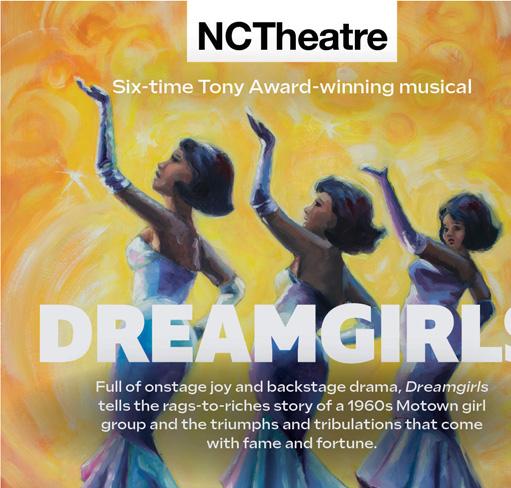
919-782-0801
wwwdrgregweavercom
92 | WALTER
Courtesy Baileys
Marci Bailey, Trey Bailey, Clyde Bailey, Jane Bailey
Emily Cooper, Mary Leigh Lewis, Devon Brewer
Maxine DeLeonEddie Nickens, Julie Nickens
The Beaufort Historical Association held its annual Fall Party on Oct. 22 at the Beaufort Historic Site. The event featured art by JJ Jiang of Cary, lively music by Blue Moon Jazz and food from Scarborough Fare Catering. The event raised significant funds for the education and preservation programs of the BHA.
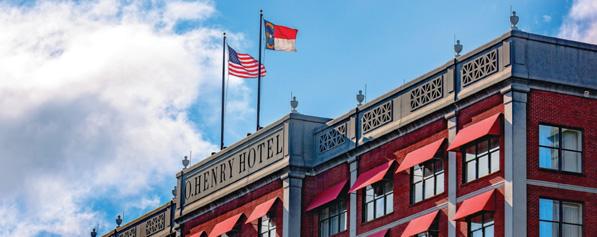


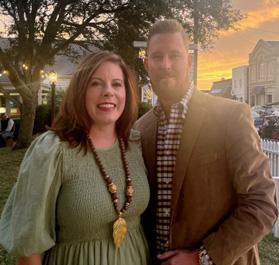



 JJ Jiang, Sue Jiang
Arianna Johnson, Jerry Johnson
BEAUFORT FALL PARTY
Marvin Barnes, Cynthia Barnes, Rebecca O’Conner, Blair Morgan, Charles O’Connor, Richard Morgan
JJ Jiang, Sue Jiang
Arianna Johnson, Jerry Johnson
BEAUFORT FALL PARTY
Marvin Barnes, Cynthia Barnes, Rebecca O’Conner, Blair Morgan, Charles O’Connor, Richard Morgan
The Art & Soul of Raleigh | 93
Historic Site Re treats for Roman tics! EMPLOYEE OWNED Save 20% on Romance Packages! Spontaneous Romance • Two Hearts, Two Nights Getaway • Endless Honeymoon • Dress for Dinner Rendezvous Anniversary Package • Three Wishes Getaway • Elegant Escape • WINK, WINK • Sustainable Romance • Mirandolina Amore’ Learn more by visiting us online or by calling. Note: Discount not available for all dates. ohenryhotel.com (336) 854-2000 | proximityhotel.com (336) 379-8200
Danielle Vollnogle, Mel O’Berry Alyssa Pressler, JW Parker
Courtesy Beaufort
LIBATIONS | MIX&SIP MIXOLOGY CLASSES | TAKE HOME KITS | WEDDING + EVENT SERVICES


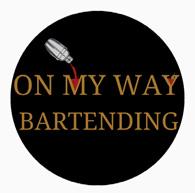

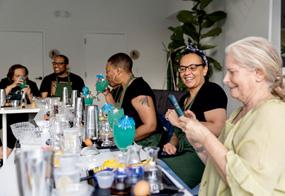
SUBSCRIBE


newsletter



stay current on the best in art, culture, food and fun


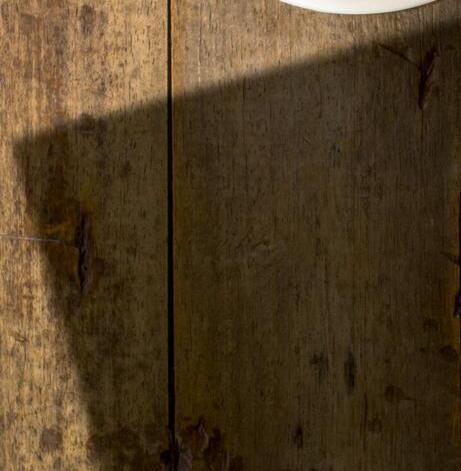

THE WHIRL
AN AFTERNOON WITH MISS AMERICA
On Nov. 2, The Miss North Carolina Scholarship Organization held a fundraising event at The Woman’s Club of Raleigh. The 2022 Miss America, Emma Broyles, was an honored guest. Attendees included local title holders and directors, along with business sponsors.
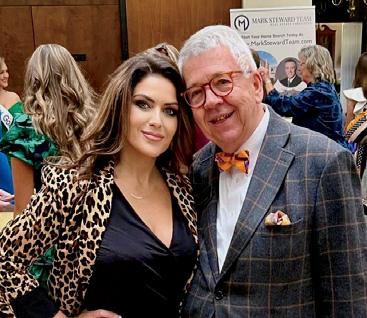

 Karl DeBlaker
Kerrigan Brown, Freddie Lee Heath, Emma Broyles, Mark Steward, Karolyn Martin
Julie Martin, McNeil Chestnut
Karl DeBlaker
Kerrigan Brown, Freddie Lee Heath, Emma Broyles, Mark Steward, Karolyn Martin
Julie Martin, McNeil Chestnut
94 | WALTER
Emma Broyles, Kerrigan Brown, Carli Batson, Karolyn Martin
to our
c n
EXTRAS
There’s always something to discover on our website and social media. Here’s what’s been happening.
FOLLOW US @WALTERMAGAZINE


WEB EXCLUSIVE STORIES
I TOOK THE DIRECT FLIGHT FROM RALEIGH TO THE BAHAMAS AND HERE’S HOW IT WENT

The new flight to Grand Bahama is the seventh international route out of RDU.
446
HOW TO MAKE SWEET AND SAVORY PUMPKIN RAVIOLI

A favorite from chef Oscar Gnapi at Colletta, this autumnal pasta dish combines a nutty brown butter sauce and spiced walnut.
TRENDING ON INSTAGRAM

396
Postcards from UNC Chapel Hill starring Otis aka Rameses XXII! Wishing them luck as they take on Georgia Tech today!
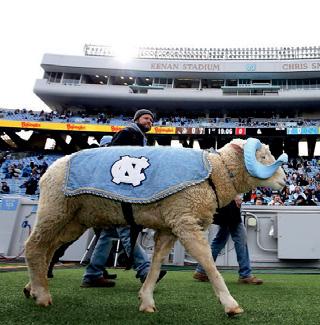
@photopup
@Michele_zaytoun_interiors Go HEELS!!!
#tarheels
@Chrisgorges
@Mharrison1026
@Kristywharvey So precious!!
Sunday Open House: Check out this moody Asheville-area home complete with panoramic Blue Ridge views, high ceilings and eclectic art. Nick King from the archives. @Westbeachbunny
@Gentry.s.b That Owl!!!!!



GALLERY C FINE ART


540 N. BLOUNT ST
919.828.3165

GALLERYC.NET


Archives
WALTER
The Art & Soul of Raleigh | 95
LAURA LACAMBRA SHUBERT
“Lunch in the Vineyard” Oil on Canvas, 36 x 48 inches
The Year of the Trail

A statewide initiative in 2023 to get more people outdoors
by ADDIE LADNER
Hiking Mt. Mitchell in Burnsville, you might think you’re in Canada: Its peak sits more than 6,000 feet above sea level, the highest point in the eastern United States. Here, in the oldest North Carolina State Park, the weather is colder and windier, forested with Frasier Firs and Spruce Pines. It’s dramatically different from the eastern part of the state, where you can paddle the Queen’s Creek Trail along the tributaries of the Intracoastal Waterway through maritime forests and marshlands at Hammocks Beach State Park. Or from the trails of Occoneechee Mountain Natural Area in Hillsborough, which take you through shrubs of mountain laurel and rhododendron, tracing the Eno River.
It’s a wonder that one can experience all of these ecosystems within the 500 miles of North Carolina. In the Triangle alone, trails offer variation and respite from our bustling urban areas. The Reedy Creek Greenway, for example, weaves through the forest

behind the North Carolina Museum of Art. In Durham, the American Tobacco Trail runs along an abandoned railroad. Each of these trails connects us to this state, its history, its future and one another. “When you hike a trail, you know you’re connected to something much bigger,” says Palmer McIntyre with Piedmont Trails Coalition.
Much of this is thanks to the North Carolina State Trails Act. Launched in 1973, it was designed to encourage people to experience the nature of North Carolina. And this year, to honor its 50th anniversary, the North Carolina Great Trails Coalition, the
North Carolina State Parks and dozens of other outdoor and recreation nonprofits are celebrating “The Year of the Trail.” It’s a statewide initiative to move, breathe, think and connect — outside, on trails.
“We’re really trying to tie things together. We want even more people discovering North Carolina’s amazing landscapes and communities,” says McIntyre, who is also the Year of the Trail director. Throughout 2023, expect events, campaigns and education programs to encourage people to hit the trails. And, McIntyre reminds us, “Hiking isn’t the only trail experience to have. It might be paddling, biking or horseback riding. It can be on a natural surface, on a paved trail, in an urban or wilderness environment.”
The Year of the Trail initiative starts on Jan. 1, with First Day Hikes in recreation areas and state parks (visit greattrailsnc.com for more info) — but feel free to do your own thing, too. Says McIntyre: “We want people to start the year off with good intentions and get on the trails.”
96 | WALTER END NOTE
courtesy North Carolina Great Trails Coalition








4401 Glenwood Ave, Raleigh, NC 27612(919) 571-2881www.diamondsdirect.com
Innovation.



















It’s feeling the pulse of the next level o of cardiac care and wellness. It ’s seeing possibilities where others see roadblock s. Pioneering new minimally invasive procedures and robotic-assisted surgeries. Transforming theor y into curative strategies. Even more than that, however, it ’s passion, compassion, th assion, com All joining experience, exper tise and technology. novation forces to create a special place where in saves lives. Visit us at ear ts. wakemed.org/h


Your heart. Your choice.























































































 Table by Precedent, Chairs by Hickory Chair, Sculpture by Utterrmost, 8’ x 11’ Hand-knotted Wool Rug from Pakistan
Table by Precedent, Chairs by Hickory Chair, Sculpture by Utterrmost, 8’ x 11’ Hand-knotted Wool Rug from Pakistan













































 courtesy contributors
courtesy contributors

 — Kathryn Swearingen
— Kathryn Swearingen

 — Violet Rhinehart
— Violet Rhinehart












 courtesy DPAC (TINA TURNER); courtesy Downtown Raleigh Alliance (ILLUMINATE ART WALK)
courtesy DPAC (TINA TURNER); courtesy Downtown Raleigh Alliance (ILLUMINATE ART WALK)


































 by HAMPTON WILLIAMS HOFER photography by BRYAN REGAN
by HAMPTON WILLIAMS HOFER photography by BRYAN REGAN













 by JIM JENKINS photography by BOB KARP
by JIM JENKINS photography by BOB KARP






 by WILEY CASH photography by MALLORY CASH
by WILEY CASH photography by MALLORY CASH






































































 by
by




 OHN GESSNER
OHN GESSNER











































 by
GARRETT BETHMANN
photographyby JOSHUASTEADMAN
by
GARRETT BETHMANN
photographyby JOSHUASTEADMAN

 —Adam D. Cohen
—Adam D. Cohen







































 Santa, Owen Kinlaw
Reverie Drake
John Strenkowski, Elise Strenkowski, Nell McAulay, Lucy Davis
Jodi Strenkowski, Nell McAulay Heather Lawson, Benton Lawson
Walter Royal, Jill Highsmith Brad Sears, Rebecca Sears
Beth Parsons, Marie Osmond, David Crabtree
Santa, Owen Kinlaw
Reverie Drake
John Strenkowski, Elise Strenkowski, Nell McAulay, Lucy Davis
Jodi Strenkowski, Nell McAulay Heather Lawson, Benton Lawson
Walter Royal, Jill Highsmith Brad Sears, Rebecca Sears
Beth Parsons, Marie Osmond, David Crabtree

























 Linda Quarles, Orage Quarles, Judith Burrell
Vic Bell, Temple Sloan, Carolyn Sloan, Reid Wilson
Reid Wilson, Vic Bell, Earl Johnson
Charles Hayworth, Debbie Hayworth
Linda Quarles, Orage Quarles, Judith Burrell
Vic Bell, Temple Sloan, Carolyn Sloan, Reid Wilson
Reid Wilson, Vic Bell, Earl Johnson
Charles Hayworth, Debbie Hayworth




















 JJ Jiang, Sue Jiang
Arianna Johnson, Jerry Johnson
BEAUFORT FALL PARTY
Marvin Barnes, Cynthia Barnes, Rebecca O’Conner, Blair Morgan, Charles O’Connor, Richard Morgan
JJ Jiang, Sue Jiang
Arianna Johnson, Jerry Johnson
BEAUFORT FALL PARTY
Marvin Barnes, Cynthia Barnes, Rebecca O’Conner, Blair Morgan, Charles O’Connor, Richard Morgan













 Karl DeBlaker
Kerrigan Brown, Freddie Lee Heath, Emma Broyles, Mark Steward, Karolyn Martin
Julie Martin, McNeil Chestnut
Karl DeBlaker
Kerrigan Brown, Freddie Lee Heath, Emma Broyles, Mark Steward, Karolyn Martin
Julie Martin, McNeil Chestnut

























